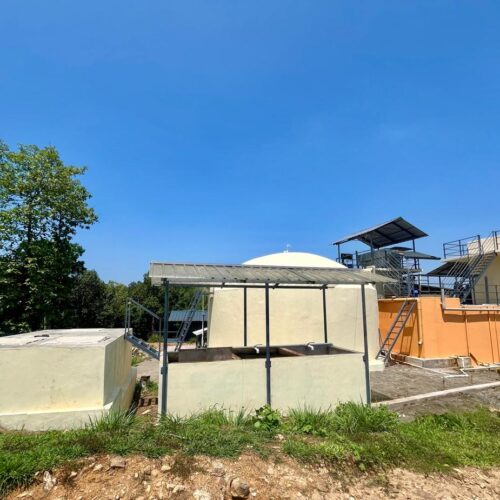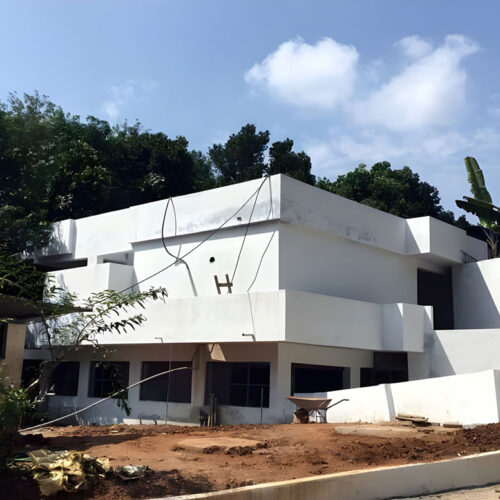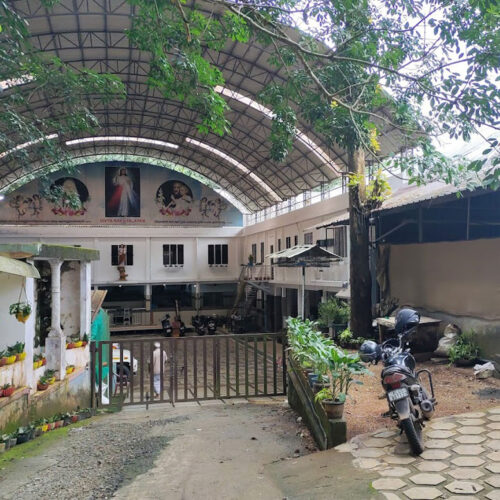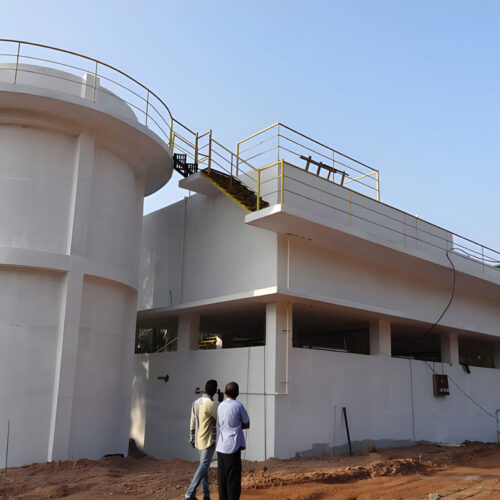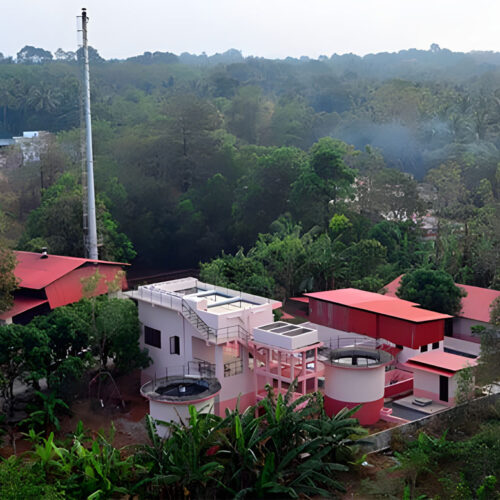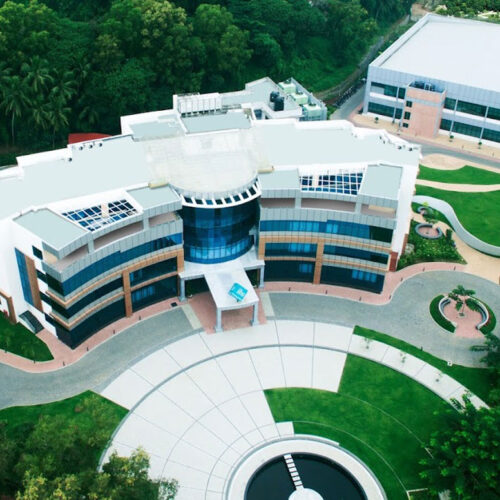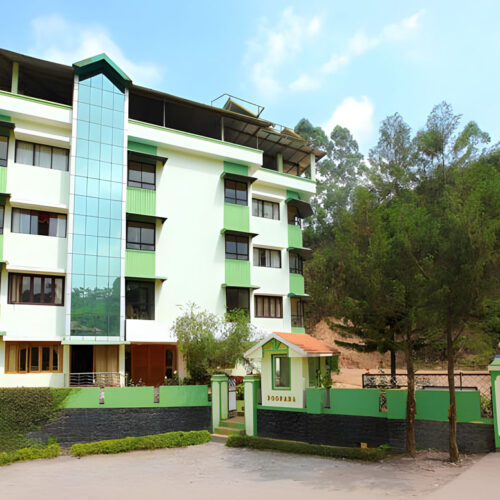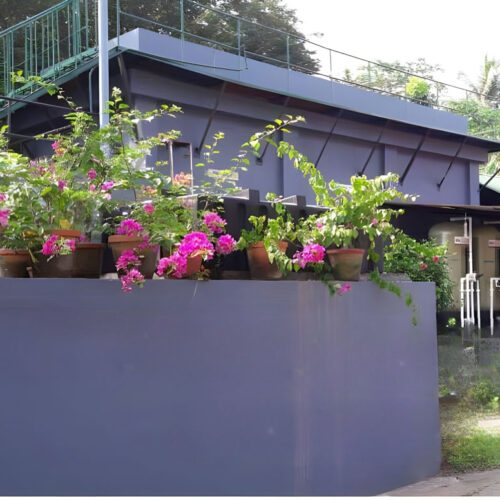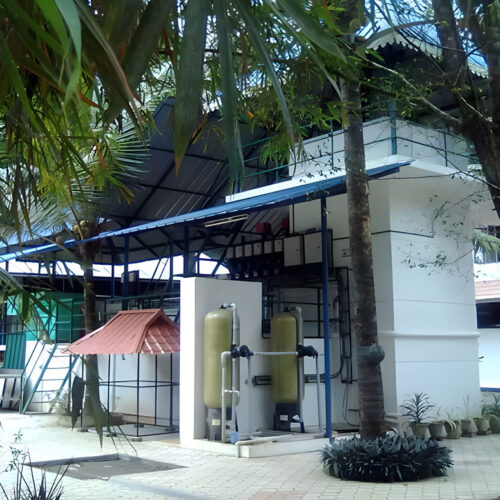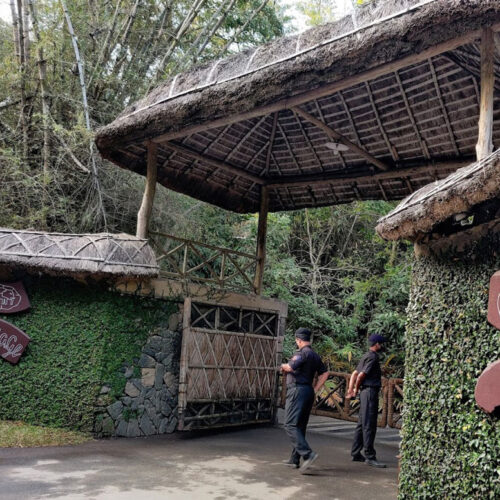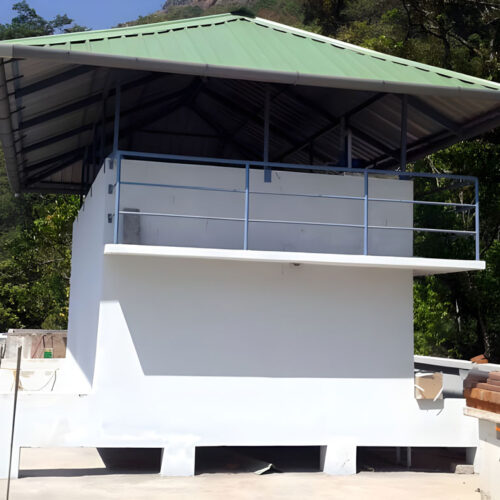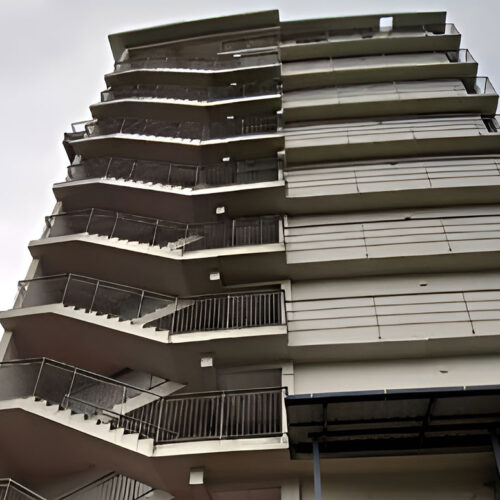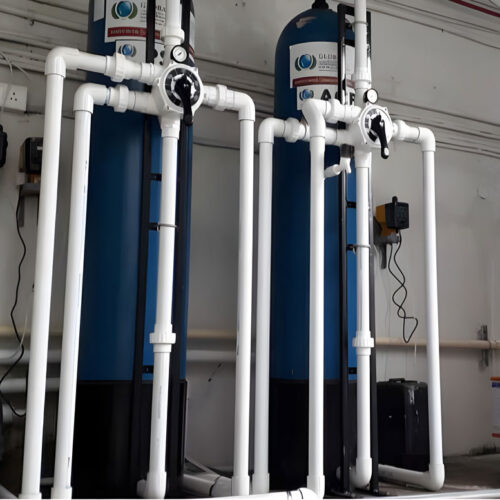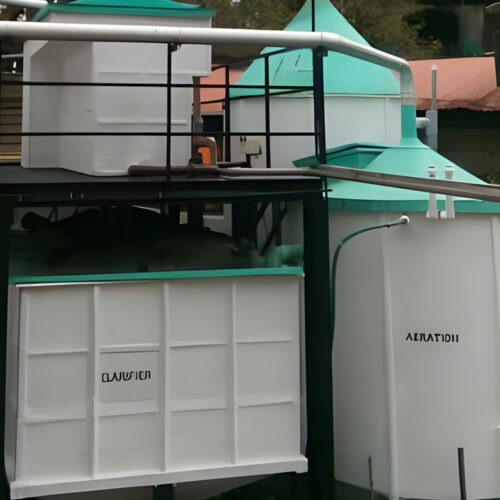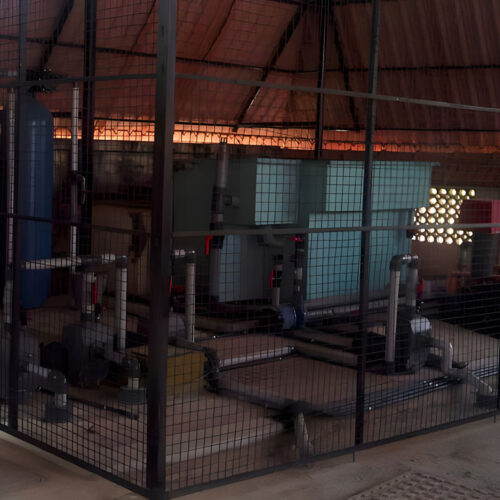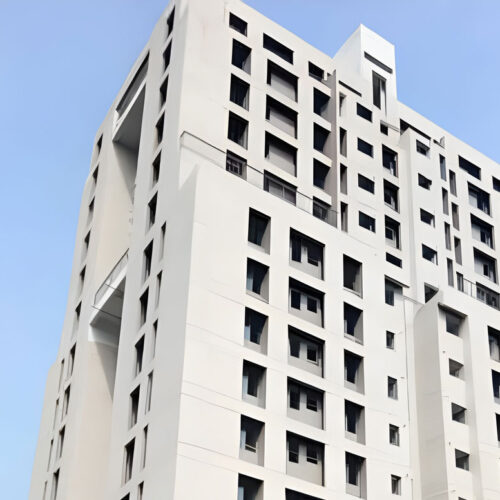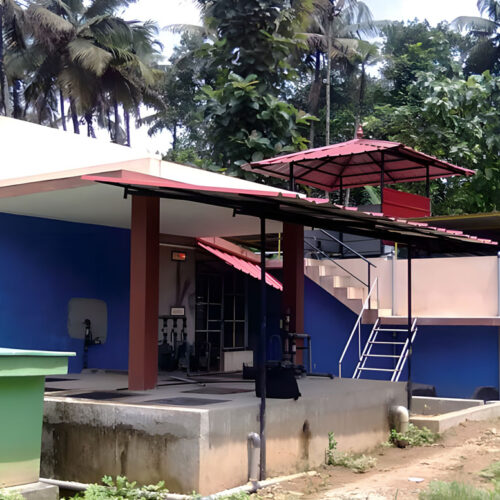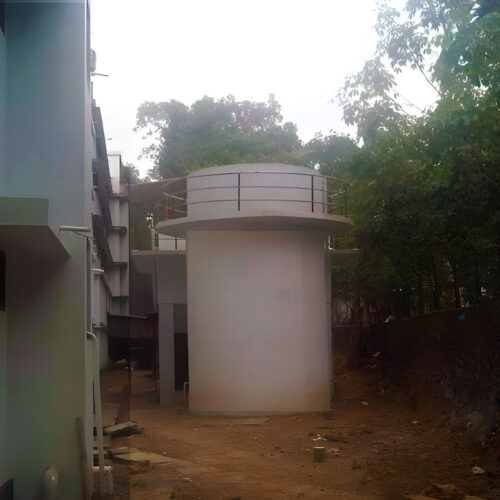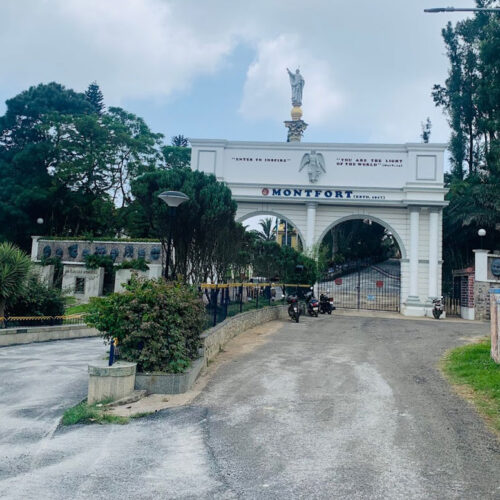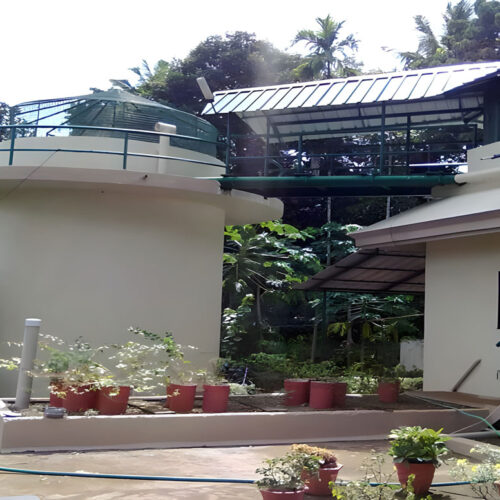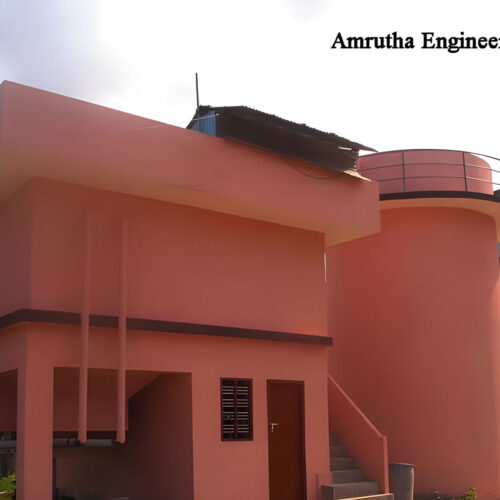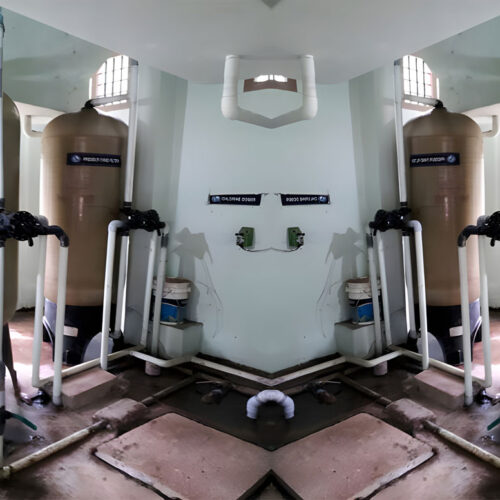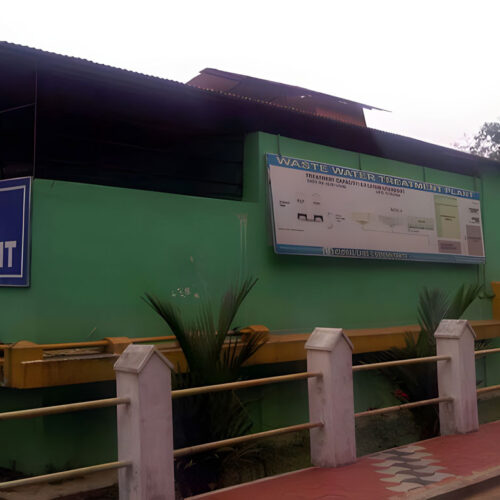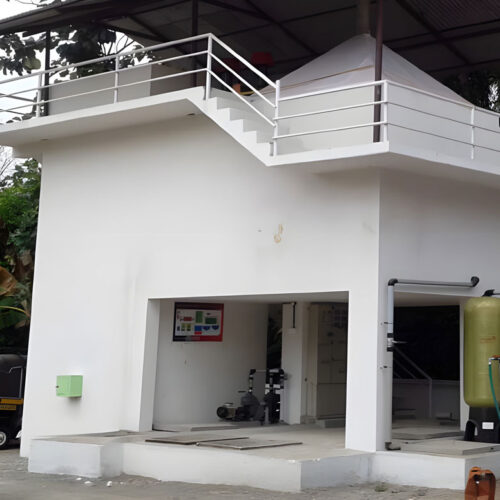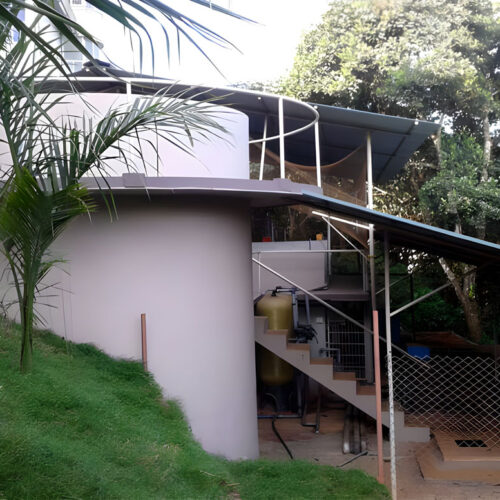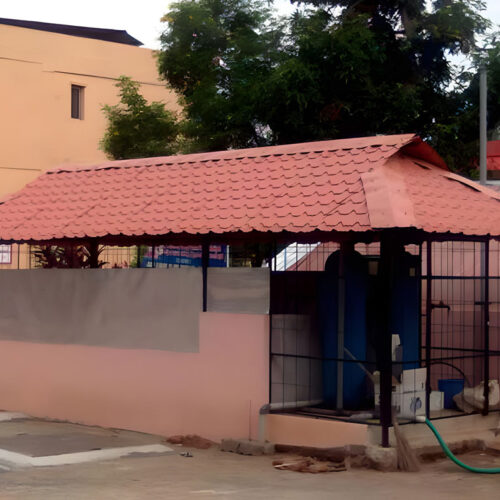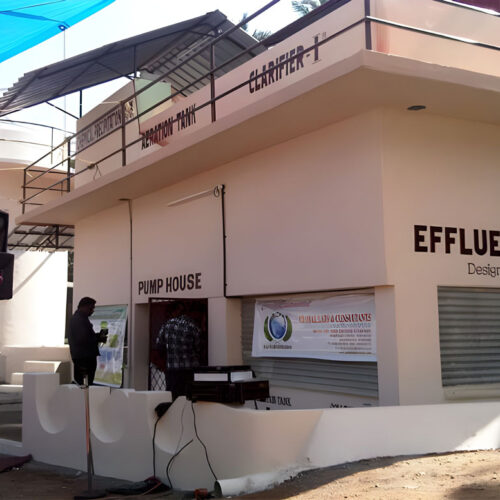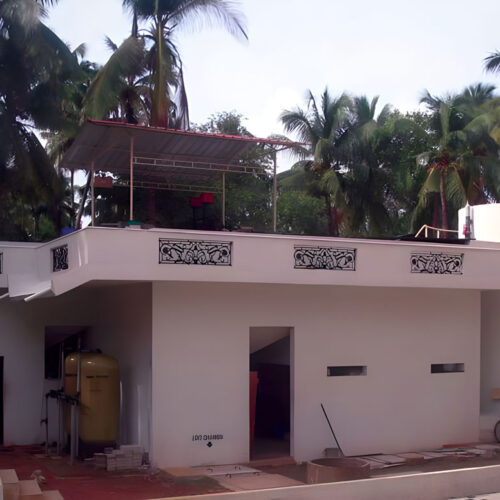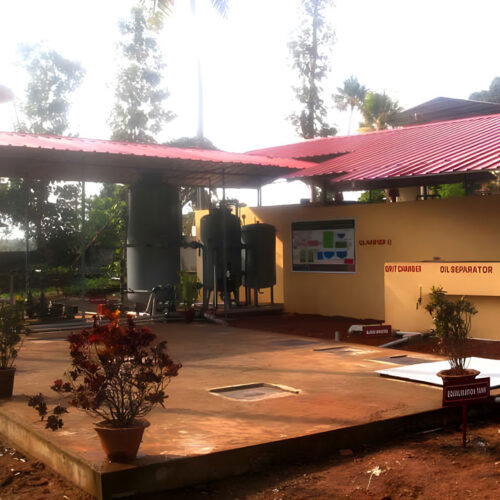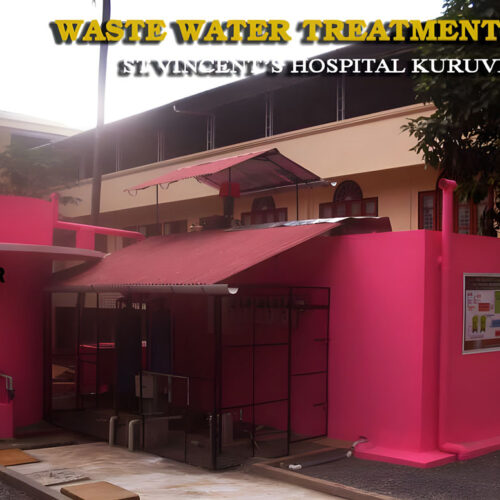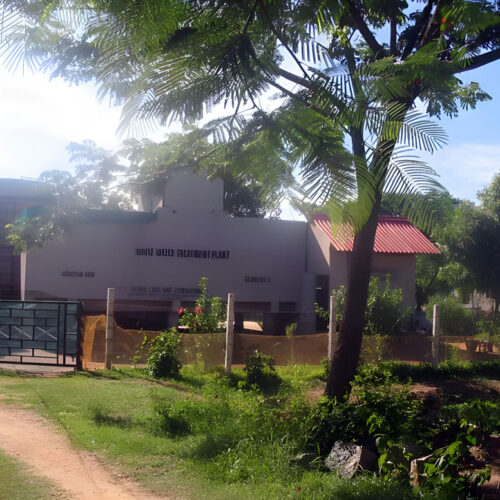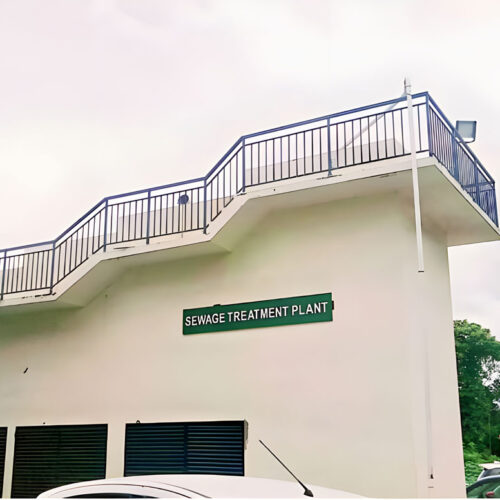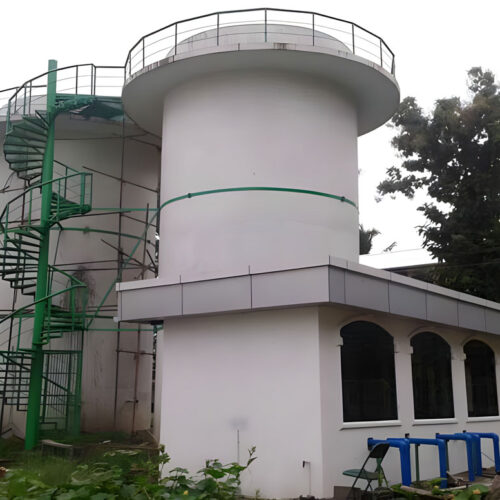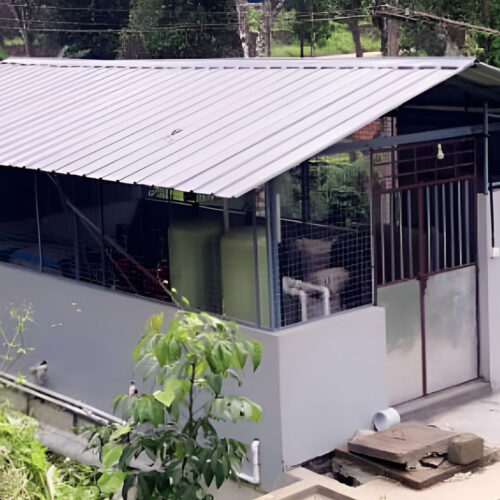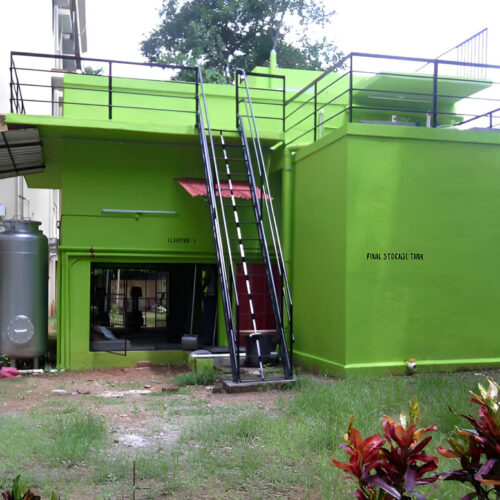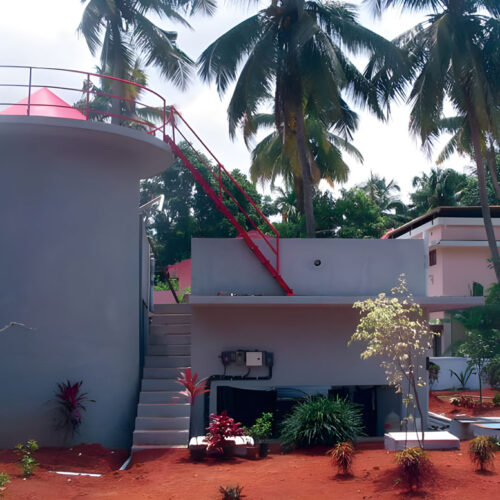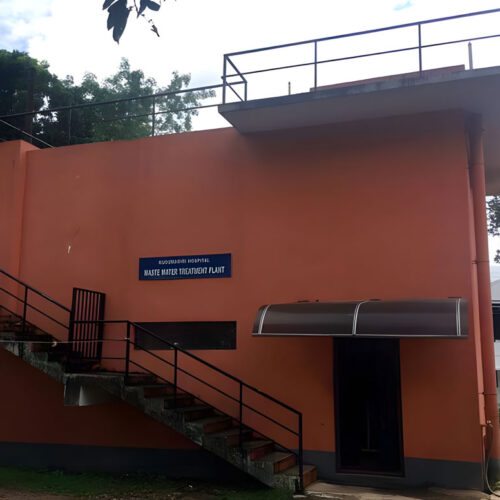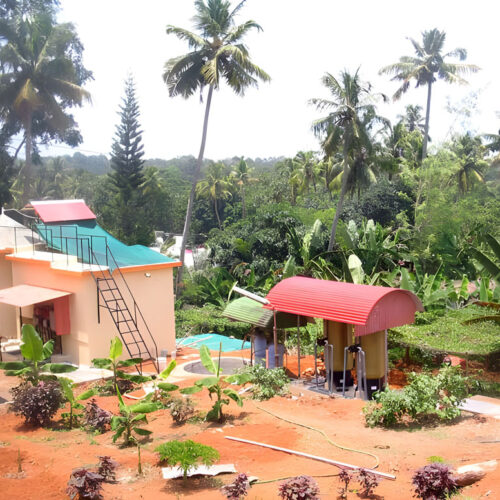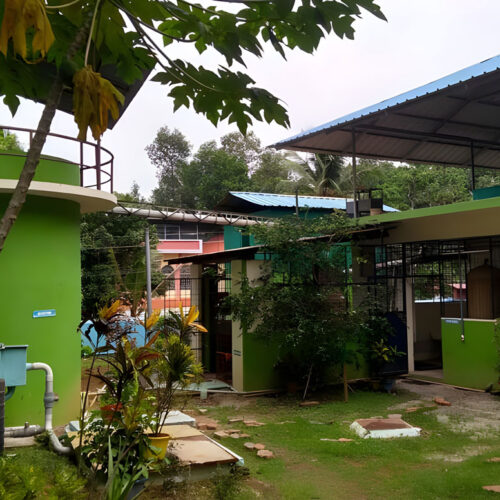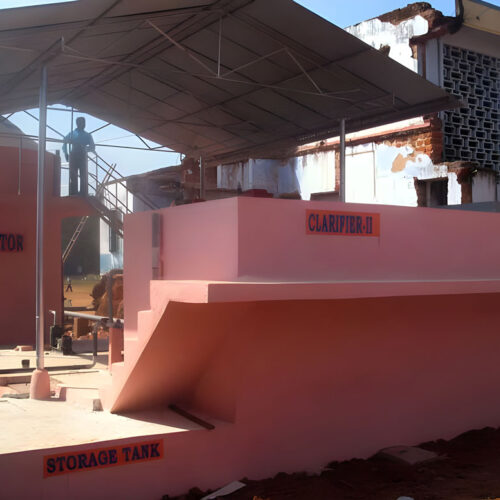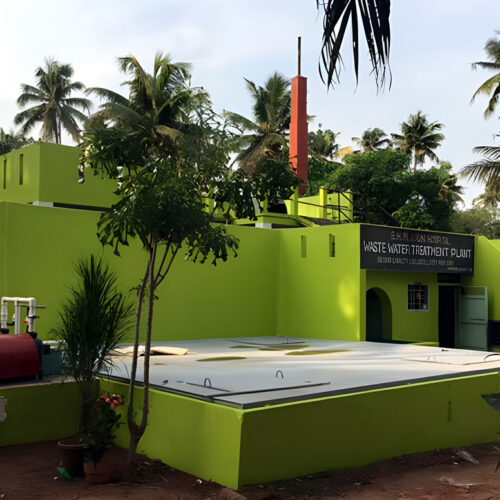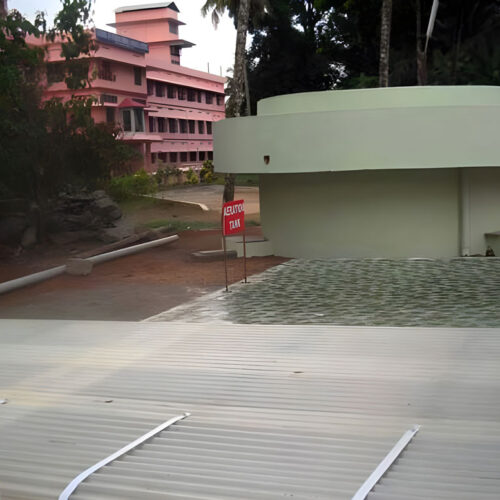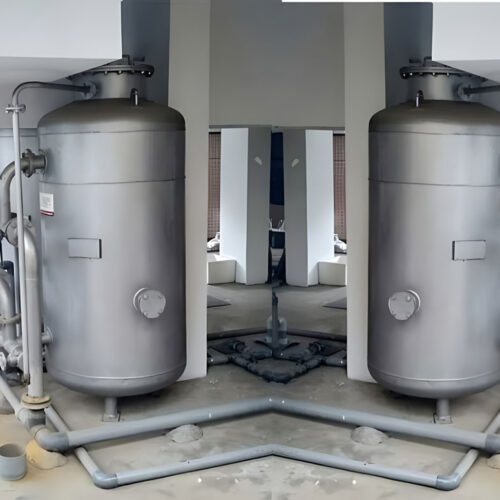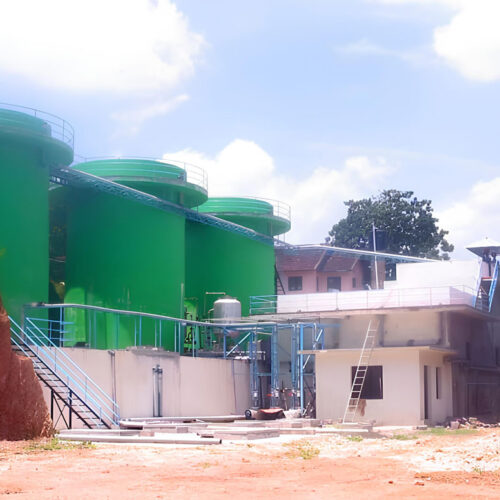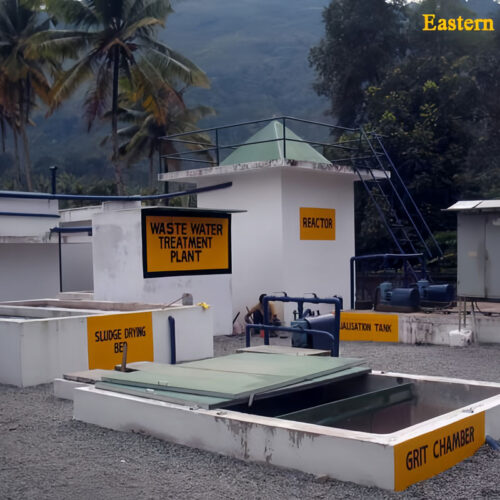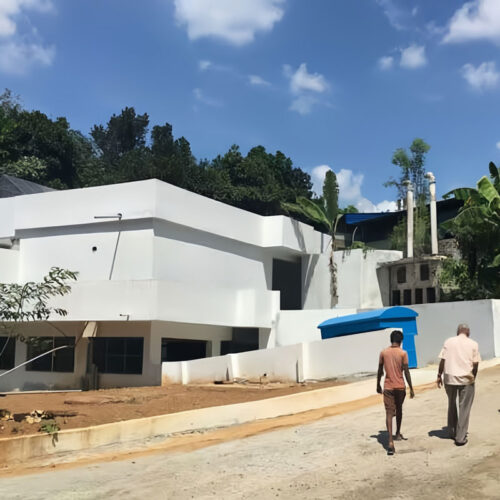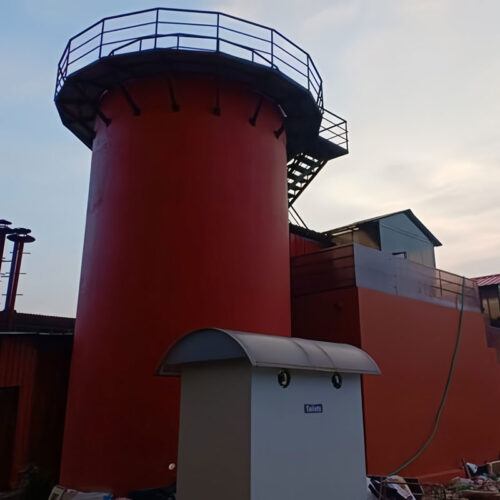Clients
We serve the needs of more than 900 client list in Kerala, Tamil Nadu, Karnataka and Lakshadweep.
Maria Bakers
About client
Gagultha Retreat Centre, situated in Thalakkottukara, Thrissur, initiated a significant project in 2017 involving the design and installation of a Water Treatment Plant (WTP). Boasting a daily capacity of 200 cubic meters, this initiative incorporated both Global System (GS) and Moving Bed Biofilm Reactor (MBBR) technologies to ensure a reliable and purified water supply for the retreat centre.
This project at Gagultha Retreat Centre underscores the establishment’s dedication to providing a sustainable and high-quality environment for retreats and gatherings. By integrating advanced water treatment methods like GS and MBBR, Gagultha Retreat Centre ensures access to purified water resources while prioritizing responsible resource management. The WTP aligns with Gagultha Retreat Centre’s commitment to offering a serene and spiritually enriching experience in Thalakkottukara, Thrissur.
Project information
Organization
Maria Bakers
Location
Thalakkottukara, Thrissur
Service Provided & Year
WTP – Design, Installation (2018)
Technology
GS (Global System, an Integrated System of Anaerobic & Aerobic biodegradation process.) + Moving Bed Biofilm Reactor (MBBR)
Capacity
200 cubic meters per day
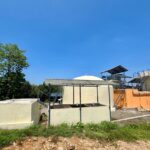
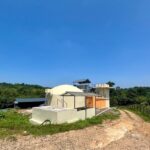
Project goals
In 2017, Gagultha Retreat Centre in Thalakkottukara, Thrissur, embarked on a significant project with the design and installation of a Water Treatment Plant (WTP), featuring a daily capacity of 200 cubic meters and incorporating both Global System (GS) and Moving Bed Biofilm Reactor (MBBR) technologies. The primary goals of this initiative were to ensure a reliable and purified water supply for the retreat centre, reflecting Gagultha Retreat Centre’s commitment to providing a sustainable and high-quality environment for spiritual retreats and gatherings. By integrating advanced water treatment methods, the project aimed to ensure access to purified water resources, contributing significantly to the centre’s ability to offer a serene and spiritually enriching experience while maintaining responsible resource management practices. This project underscores Gagultha Retreat Centre’s vision of fostering spiritual well-being in Thalakkottukara, Thrissur.
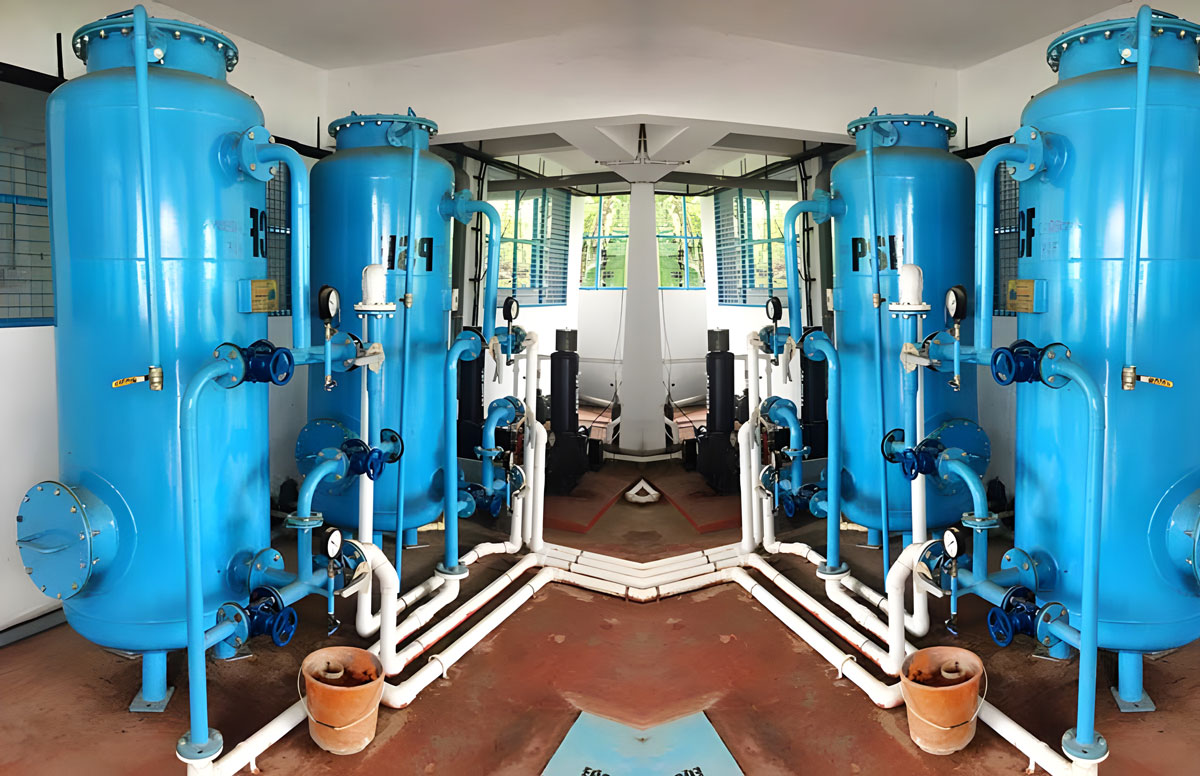
Gagultha Retreat Centre
About client
Gagultha Retreat Centre, situated in Thalakkottukara, Thrissur, initiated a significant project in 2017 involving the design and installation of a Water Treatment Plant (WTP). Boasting a daily capacity of 200 cubic meters, this initiative incorporated both Global System (GS) and Moving Bed Biofilm Reactor (MBBR) technologies to ensure a reliable and purified water supply for the retreat centre.
This project at Gagultha Retreat Centre underscores the establishment’s dedication to providing a sustainable and high-quality environment for retreats and gatherings. By integrating advanced water treatment methods like GS and MBBR, Gagultha Retreat Centre ensures access to purified water resources while prioritizing responsible resource management. The WTP aligns with Gagultha Retreat Centre’s commitment to offering a serene and spiritually enriching experience in Thalakkottukara, Thrissur.
Project information
Organization
Gagultha Retreat Centre
Location
Thalakkottukara, Thrissur
Service Provided & Year
WTP – Design, Installation (2018)
Technology
GS (Global System, an Integrated System of Anaerobic & Aerobic biodegradation process.) + Moving Bed Biofilm Reactor (MBBR)
Capacity
200 cubic meters per day



Project goals
In 2017, Gagultha Retreat Centre in Thalakkottukara, Thrissur, embarked on a significant project with the design and installation of a Water Treatment Plant (WTP), featuring a daily capacity of 200 cubic meters and incorporating both Global System (GS) and Moving Bed Biofilm Reactor (MBBR) technologies. The primary goals of this initiative were to ensure a reliable and purified water supply for the retreat centre, reflecting Gagultha Retreat Centre’s commitment to providing a sustainable and high-quality environment for spiritual retreats and gatherings. By integrating advanced water treatment methods, the project aimed to ensure access to purified water resources, contributing significantly to the centre’s ability to offer a serene and spiritually enriching experience while maintaining responsible resource management practices. This project underscores Gagultha Retreat Centre’s vision of fostering spiritual well-being in Thalakkottukara, Thrissur.

Divya Rakshaka
About client
Divya Rakshaka, located in Thodupuzha, Idukki, initiated a significant project in 2018 involving the design and installation of a Water Treatment Plant (WTP). Boasting a daily capacity of 100 cubic meters and incorporating Global System (GS) technology, this initiative aimed to ensure a reliable and purified water supply. Additionally, the project included the establishment of an Annual Maintenance Contract (AMC), emphasizing a commitment to ongoing maintenance for the optimal functioning of the water treatment system.
This project at Divya Rakshaka reflects the establishment’s dedication to providing a sustainable and high-quality service. By integrating advanced water treatment methods and implementing an AMC, Divya Rakshaka ensures access to purified water resources while prioritizing responsible resource management. The WTP aligns with Divya Rakshaka’s commitment to offering reliable water solutions in Thodupuzha, Idukki.
Project information
Organization
Divya Rakshaka
Location
Thodupuzha, Idukki
Service Provided & Year
WTP – Design, Installation (2018)
Technology
GS (Global System, an Integrated System of Anaerobic & Aerobic biodegradation process.)
Capacity
100 cubic meters per day
Project goals
In 2018, Divya Rakshaka in Thodupuzha, Idukki, embarked on a significant project with the design and installation of a Water Treatment Plant (WTP), featuring a daily capacity of 100 cubic meters and incorporating Global System (GS) technology. The primary goals of this initiative were to ensure a reliable and purified water supply, reflecting Divya Rakshaka’s commitment to providing a sustainable and high-quality service. The establishment further emphasized responsible resource management by implementing an Annual Maintenance Contract (AMC), ensuring ongoing maintenance for the optimal functioning of the water treatment system. This project underscores Divya Rakshaka’s vision of offering reliable water solutions and contributing to responsible water management in Thodupuzha, Idukki.

Sreevalsam Institute of Medical Sciences
About client
Sreevalsam Institute of Medical Sciences, situated in Naduvattom, Edappa, Malappuram, undertook a significant project in 2013 involving the design and installation of a Water Treatment Plant (WTP). With a daily capacity of 500 cubic meters and incorporating Global System (GS) technology, this initiative aimed to ensure a reliable and purified water supply for the medical institute.
This project at Sreevalsam Institute of Medical Sciences reflects the institution’s commitment to providing a sustainable and high-quality healthcare environment. By integrating advanced water treatment methods, Sreevalsam Institute ensures access to purified water resources, contributing to the overall well-being and health services offered within the medical facility. The WTP aligns with Sreevalsam Institute of Medical Sciences’ dedication to excellence in healthcare in the region of Malappuram.
Project information
Organization
Sreevalsam Institute of Medical Sciences
Location
Naduvattom, Edappa, Malappuram
Service Provided & Year
WTP – Design, Installation (2013)
Technology
GS (Global System, an Integrated System of Anaerobic & Aerobic biodegradation process.)
Capacity
500 cubic meters per day


Project goals
In 2013, Sreevalsam Institute of Medical Sciences in Naduvattom, Edappa, Malappuram, initiated a significant project with the design and installation of a Water Treatment Plant (WTP), featuring a daily capacity of 500 cubic meters and incorporating Global System (GS) technology. The primary goals of this initiative were to secure a reliable and purified water supply for the medical institute, reflecting Sreevalsam Institute’s commitment to providing a sustainable and high-quality healthcare environment. By integrating advanced water treatment methods, the project aimed to ensure access to purified water resources, contributing significantly to the institute’s ability to deliver top-notch health services while maintaining stringent hygiene standards. This project underscores Sreevalsam Institute of Medical Sciences’ vision of excellence in healthcare within the region of Malappuram.

Rajagiri Hospital
About client
Rajagiri Hospital, located in Chunangamvely, Aluva, Ernakulam, undertook a substantial project in 2014 involving the design and installation of a Waste Water Treatment Plant (WWTP). Boasting a daily capacity of 1000 cubic meters and incorporating “Global technology”, this initiative aimed to ensure a reliable and purified water supply for the hospital’s irrigation needs for maintaining lush greenery and hygienic environment.
This project at Rajagiri Hospital underscores the institution’s dedication to providing a sustainable and high-quality healthcare environment. By integrating advanced water treatment methods, Rajagiri Hospital ensures access to purified water resources, contributing to the overall health and well-being of patients while maintaining stringent hygiene standards. The WTP aligns with Rajagiri Hospital’s commitment to excellence in medical services within the region of Ernakulam.
Project information
Organization
Rajagiri Hospital
Location
Chunangamvely, Aluva, Ernakulam
Service Provided & Year
STP – Design, Installation (2014)
Technology
GS (Global System, an Integrated System of Anaerobic & Aerobic biodegradation process.)
Capacity
1000 cubic meters per day
Project goals
In 2014, Rajagiri Hospital in Chunangamvely, Aluva, Ernakulam, initiated a significant project with the design and installation of a Water Treatment Plant (WTP), featuring an impressive daily capacity of 1000 cubic meters and incorporating Global System (GS) technology. The primary goals of this initiative were to secure a reliable and purified water supply for the hospital’s medical facilities, reflecting Rajagiri Hospital’s commitment to providing a sustainable and high-quality healthcare environment. By integrating advanced water treatment methods, the project aimed to ensure access to purified water resources, contributing significantly to the hospital’s ability to deliver top-notch medical services while maintaining stringent hygiene standards. This project underscores Rajagiri Hospital’s vision of excellence in healthcare within the region of Ernakulam.
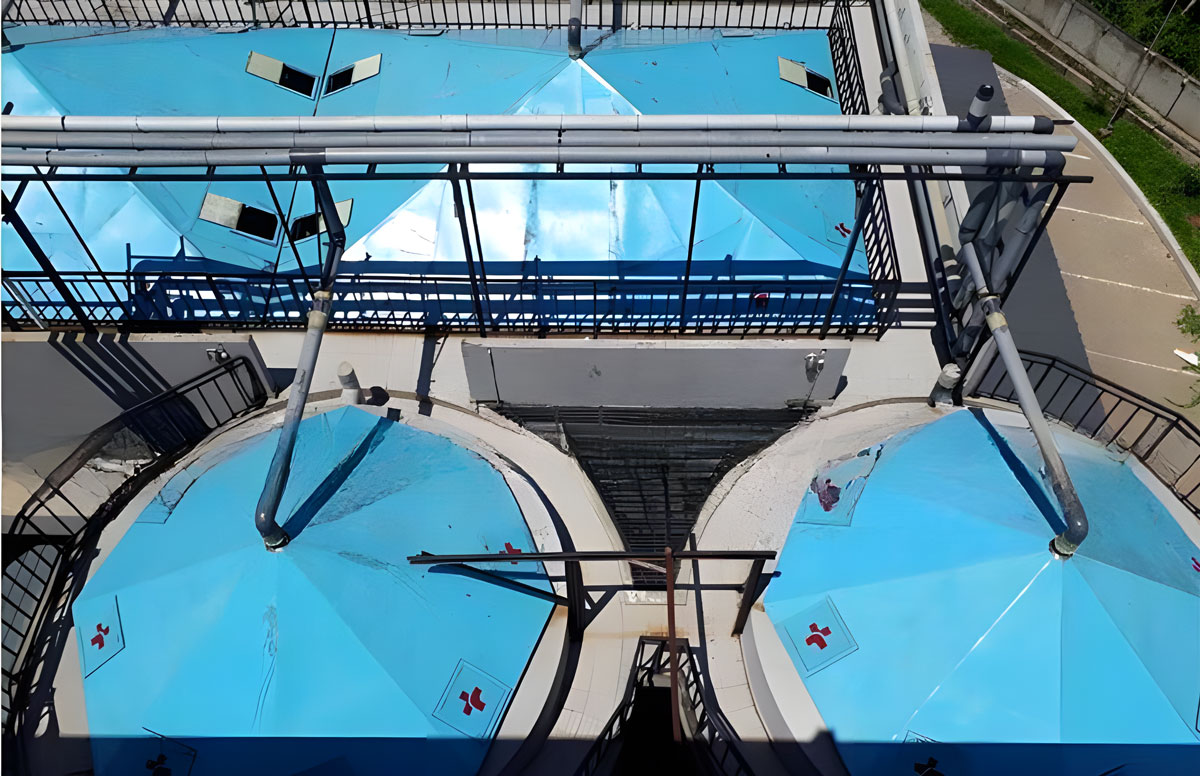
Amala Institute of Medical Sciences
About client
Amala Institute of Medical Sciences, located in Amala Nagar, Thrissur, undertook a significant project in 2004 involving the design and installation of a Water Treatment Plant (WTP). Boasting a daily capacity of 1000 cubic meters and incorporating Global System (GS) technology, this initiative aimed to ensure a reliable and purified water supply for the medical institute.
This project at Amala Institute of Medical Sciences reflects the institution’s dedication to providing a sustainable and high-quality healthcare environment. By integrating advanced water treatment methods, Amala Institute ensures access to purified water resources, contributing to the overall well-being and health services offered within the medical facility. The WTP aligns with Amala Institute of Medical Sciences’ commitment to excellence in healthcare in the region of Thrissur.
Project information
Organization
Amala Institute of Medical Sciences
Location
Amala Nagar, Thrissur
Service Provided & Year
WTP – Design, Installation (2004)
Technology
GS (Global System, an Integrated System of Anaerobic & Aerobic biodegradation process.)
Capacity
1000 cubic meters per day



Project goals
In 2004, Amala Institute of Medical Sciences in Amala Nagar, Thrissur, initiated a pivotal project with the design and installation of a Water Treatment Plant (WTP), featuring an impressive daily capacity of 1000 cubic meters and incorporating Global System (GS) technology. The primary goal of this initiative was to secure a reliable and purified water supply for the medical institute, reflecting Amala Institute’s commitment to providing a sustainable and high-quality healthcare environment. By integrating advanced water treatment methods, the project aimed to ensure access to purified water resources, contributing significantly to the institute’s ability to deliver top-notch health services and maintain optimal hygiene standards. This project underscores Amala Institute of Medical Sciences’ vision of excellence in healthcare within the region of Thrissur.

IBS Technopark
About client
IBS Technopark, situated in the Technopark Campus, Thiruvananthapuram, undertook a significant project in 2012 involving the design and installation of a Water Treatment Plant (WTP). Boasting a daily capacity of 200 cubic meters and incorporating Global System (GS) technology, this initiative aimed to ensure a reliable and purified water supply for the Technopark Campus. Additionally, the project included the establishment of an Annual Maintenance Contract (AMC), emphasizing a commitment to ongoing maintenance for the optimal functioning of the water treatment system.
This project at IBS Technopark reflects the institution’s dedication to providing a sustainable and high-quality working environment for its employees. By integrating advanced water treatment methods and implementing an AMC, IBS Technopark ensures access to purified water resources while prioritizing responsible resource management. The WTP aligns with IBS Technopark’s commitment to fostering technological innovation in the vibrant ecosystem of Technopark, Thiruvananthapuram.
Project information
Organization
IBS Technopark
Location
Technopark Campus, Thiruvananthapuram
Service Provided & Year
WTP – Design, Installation (2012), AMC (Annual Maintenance Contract on current year)
Technology
GS (Global System, an Integrated System of Anaerobic & Aerobic biodegradation process.)
Capacity
200 cubic meters per day
Project goals
In 2012, IBS Technopark at the Technopark Campus, Thiruvananthapuram, embarked on a significant project with the design and installation of a Water Treatment Plant (WTP) featuring a daily capacity of 200 cubic meters and incorporating Global System (GS) technology. The primary goal of this initiative was to ensure a reliable and purified water supply for the Technopark Campus, reflecting IBS Technopark’s commitment to providing a sustainable and high-quality working environment for its employees. The establishment further emphasized responsible resource management by implementing an Annual Maintenance Contract (AMC), ensuring ongoing maintenance for the optimal functioning of the water treatment system. This project aligns with IBS Technopark’s vision of contributing to technological innovation within the vibrant ecosystem of Technopark, Thiruvananthapuram.

Poopada Resort
About client
Poopada Resort, located in Kannan Devan Hills, near KDH Club, Idukki, initiated a significant project in 2015 involving the design and installation of a Water Treatment Plant (WTP). With a daily capacity of 50 cubic meters, this initiative incorporated both Global System (GS) and Moving Bed Biofilm Reactor (MBBR) technologies to ensure a reliable and purified water supply for the resort.
This project at Poopada Resort underscores the establishment’s commitment to providing a sustainable and high-quality hospitality experience. By integrating advanced water treatment methods like GS and MBBR, Poopada Resort ensures access to purified water resources while prioritizing responsible resource management. The WTP aligns with Poopada Resort’s dedication to offering a serene and eco-friendly retreat in the picturesque Kannan Devan Hills, Idukki.
Project information
Organization
Poopada Resort
Location
Kannan Devan Hills, Idukki
Service Provided & Year
WTP – Design, Installation (2015)
Technology
GS (Global System, an Integrated System of Anaerobic & Aerobic biodegradation process.) + MBBR (Moving Bed Biofilm Reactor)
Capacity
50 cubic meters per day
Project goals
In 2015, Poopada Resort in Kannan Devan Hills, near KDH Club, Idukki, initiated a noteworthy project with the design and installation of a Water Treatment Plant (WTP) boasting a daily capacity of 50 cubic meters. The incorporation of both Global System (GS) and Moving Bed Biofilm Reactor (MBBR) technologies underscored the primary goal of ensuring a reliable and purified water supply for the resort. Poopada Resort’s commitment to sustainability and delivering a high-quality hospitality experience was evident in the advanced water treatment methods employed, aligning with their vision of offering a serene and eco-friendly retreat amidst the picturesque landscape of Kannan Devan Hills, Idukki.

Coconut Lagoon
About client
Coconut Lagoon, situated in Kumarakom, Kottayam, undertook a significant project in 2016 involving the design and installation of a Water Treatment Plant (WTP). Boasting a daily capacity of 100 cubic meters and incorporating Global System (GS) technology, this initiative aimed to ensure a reliable and purified water supply for the establishment.
This project at Coconut Lagoon reflects the establishment’s commitment to providing a sustainable and high-quality hospitality experience. By integrating advanced water treatment methods, Coconut Lagoon ensures access to purified water resources while prioritizing responsible resource management. The WTP aligns with Coconut Lagoon’s dedication to offering an eco-friendly and culturally rich stay in the serene backwaters of Kumarakom, Kottayam.
Project information
Organization
Coconut Lagoon
Location
Kumarakom, Kottayam
Service Provided & Year
WTP – Design, Installation (2016)
Technology
GS (Global System, an Integrated System of Anaerobic & Aerobic biodegradation process.)
Capacity
100 cubic meters per day
Project goals
In 2016, Coconut Lagoon in Kumarakom, Kottayam, embarked on a significant project with the design and installation of a Water Treatment Plant (WTP), featuring a daily capacity of 100 cubic meters and incorporating Global System (GS) technology. The primary goal of this initiative was to secure a reliable and purified water supply for the establishment, reflecting Coconut Lagoon’s commitment to providing a sustainable and high-quality hospitality experience. By integrating advanced water treatment methods, the project aimed to ensure access to purified water resources, contributing to responsible resource management and enhancing the overall eco-friendly and culturally rich stay for guests in the serene backwaters of Kumarakom.

Zallkar Central Kitchen
About client
Zallkar Central Kitchen, located in Mundupalam, Pala PO, Kottayam, embarked on a significant project in 2011 with the design and installation of a Water Treatment Plant (WTP). Featuring a daily capacity of 50 cubic meters and incorporating Global System (GS) technology, this initiative aimed to ensure a reliable and purified water supply for the central kitchen. Additionally, the project included the establishment of an Annual Maintenance Contract (AMC), underscoring a commitment to ongoing maintenance for the optimal functioning of the water treatment system.
This project at Zallkar Central Kitchen reflects the establishment’s dedication to providing a sustainable and high-quality food production environment. By integrating advanced water treatment methods and implementing an AMC, Zallkar ensures access to purified water resources while prioritizing responsible resource management. The WTP aligns with Zallkar Central Kitchen’s commitment to delivering culinary excellence with a focus on quality and sustainability in Mundupalam, Pala PO, Kottayam.
Project information
Organization
Zallkar Central Kitchen
Location
Mundupalam, Pala PO, Kottayam
Service Provided & Year
WTP – Design, Installation (2011), AMC (Annual Maintenance Contract on current year)
Technology
GS (Global System, an Integrated System of Anaerobic & Aerobic biodegradation process.)
Capacity
50 cubic meters per day
Project goals
In 2011, Zallkar Central Kitchen in Mundupalam, Pala PO, Kottayam, initiated a significant project with the design and installation of a Water Treatment Plant (WTP), featuring a daily capacity of 50 cubic meters and incorporating Global System (GS) technology. The primary goals of this initiative were to ensure a reliable and purified water supply for the central kitchen, reflecting Zallkar’s commitment to providing a sustainable and high-quality food production environment. The establishment further emphasized responsible resource management by implementing an Annual Maintenance Contract (AMC), ensuring ongoing maintenance for the optimal functioning of the water treatment system. This project aligns with Zallkar Central Kitchen’s vision of delivering culinary excellence with a focus on quality and sustainability in Mundupalam, Pala PO, Kottayam.

Spice Village
About client
Spice Village, nestled in Thekkady, Idukki, embarked on a significant project in 2008, involving the design and installation of a Water Treatment Plant (WTP). With a daily capacity of 60 cubic meters and incorporating Global System (GS) technology, this forward-thinking initiative aimed to ensure a reliable and purified water supply for the establishment. Additionally, the project included the establishment of an Annual Maintenance Contract (AMC), emphasizing a commitment to ongoing maintenance for the optimal functioning of the water treatment system.
This project at Spice Village underscores the establishment’s dedication to providing a sustainable and high-quality experience for its guests. By integrating advanced water treatment methods and implementing an AMC, Spice Village ensures access to purified water resources while prioritizing responsible resource management. The WTP aligns with Spice Village’s commitment to offering an eco-friendly and culturally immersive stay in the serene surroundings of Thekkady, Idukki.
Project information
Organization
Spice Village
Location
Thekkady, Idukki
Service Provided & Year
WTP – Design, Installation (2008), AMC (Annual Maintenance Contract on current year)
Technology
GS (Global System, an Integrated System of Anaerobic & Aerobic biodegradation process.)
Capacity
60 cubic meters per day
Project goals
In 2019, CAFS Calicut in Karippur, Malappuram, initiated a transformative project with the design and installation of a Water Treatment Plant (WTP) featuring a daily capacity of 30 cubic meters and integrating Global System (GS) technology. The primary objective was to secure a consistent and purified water supply to meet the institution’s diverse needs, reflecting CAFS Calicut’s commitment to providing a sustainable and high-quality learning environment. The project further emphasized responsible resource management through the inclusion of an Annual Maintenance Contract (AMC), ensuring ongoing maintenance for the optimal functionality of the water treatment system. This initiative aligns with CAFS Calicut’s vision of academic excellence and environmental consciousness, contributing to the institution’s holistic commitment to education in Malappuram.

Forest Glade
About client
Forest Glade, situated in 2nd mile, Pallivasal, Idukki, initiated a significant project in 2011 with the design and installation of a Water Treatment Plant (WTP). Boasting a daily capacity of 30 cubic meters and incorporating Global System (GS) technology, this forward-thinking initiative aimed to secure a reliable and purified water supply for the establishment. Additionally, the project included the establishment of an Annual Maintenance Contract (AMC), underscoring a commitment to ongoing maintenance for the optimal functioning of the water treatment system.
This project at Forest Glade reflects the establishment’s dedication to providing a sustainable and high-quality experience for its patrons. By integrating advanced water treatment methods and implementing an AMC, Forest Glade ensures access to purified water resources while prioritizing responsible resource management. The WTP aligns with Forest Glade’s commitment to offering a serene and environmentally conscious retreat in the picturesque landscape of Pallivasal, Idukki.
Project information
Organization
Forest Glade
Location
Pallivasal, Idukki
Service Provided & Year
WTP – Design, Installation (2011), AMC (Annual Maintenance Contract on current year)
Technology
GS (Global System, an Integrated System of Anaerobic & Aerobic biodegradation process.)
Capacity
30 cubic meters per day
Project goals
The primary goal of this initiative was to secure a reliable and purified water supply for the establishment, reflecting Forest Glade’s commitment to providing a sustainable and high-quality experience for its patrons. The inclusion of an Annual Maintenance Contract (AMC) further emphasized the establishment’s dedication to ongoing maintenance, ensuring the continuous efficiency of the water treatment system and contributing to responsible resource management. This project aligns with Forest Glade’s vision of offering a serene and environmentally conscious retreat in the picturesque landscape of Pallivasal, Idukki.

Cinnamon
About client
Cinnamon, located in Kumaly, Idukki, embarked on a noteworthy project in 2018 with the design and installation of a Water Treatment Plant (WTP). Featuring a daily capacity of 50 cubic meters and incorporating Global System (GS) technology, this initiative aimed to establish a reliable and purified water supply for the establishment. Additionally, the project included the establishment of an Annual Maintenance Contract (AMC), underscoring a commitment to ongoing maintenance for the optimal functioning of the water treatment system.
This project at Cinnamon reflects the establishment’s dedication to providing a sustainable and high-quality experience. By integrating advanced water treatment methods and implementing an AMC, Cinnamon ensures access to purified water resources while prioritizing responsible resource management. The WTP aligns with Cinnamon’s commitment to offering a luxurious and environmentally conscious stay for visitors in Kumaly, Idukki.
Project information
Organization
Cinnamon
Location
Kumaly, Idukki
Service Provided & Year
WTP – Design, Installation (2018 ), AMC (Annual Maintenance Contract on current year)
Technology
GS (Global System, an Integrated System of Anaerobic & Aerobic biodegradation process.)
Capacity
50 cubic meters per day
Project goals
In 2018, Cinnamon in Kumaly, Idukki, undertook a significant project focused on the design and installation of a Water Treatment Plant (WTP) with a daily capacity of 50 cubic meters, incorporating Global System (GS) technology. The primary goal of this initiative was to establish a reliable and purified water supply for the establishment, reflecting Cinnamon’s commitment to providing a sustainable and high-quality experience for its visitors. The inclusion of an Annual Maintenance Contract (AMC) further emphasized the establishment’s dedication to ongoing maintenance, ensuring the continuous efficiency of the water treatment system and contributing to responsible resource management. This project aligns with Cinnamon’s vision of offering a luxurious and environmentally conscious stay in Kumaly, Idukki.

CAFS Calicut
About client
CAFS Calicut, located in Karippur, Malappuram, undertook a significant project in 2019 involving the design and installation of a Water Treatment Plant (WTP). With a daily capacity of 30 cubic meters and incorporating Global System (GS) technology, this initiative aimed to ensure a consistent and purified water supply for the institution’s various needs. Additionally, the project included the establishment of an Annual Maintenance Contract (AMC), highlighting a commitment to ongoing maintenance for the optimal functioning of the water treatment system.
This project at CAFS Calicut reflects the institution’s dedication to providing a sustainable and high-quality learning environment. By integrating advanced water treatment methods and implementing an AMC, the institution ensures access to purified water resources while prioritizing responsible resource management. The WTP aligns with CAFS Calicut’s commitment to fostering academic excellence in an environmentally conscious manner in Karippur, Malappuram.
Project information
Organization
CAFS Calicut
Location
Karippur, Malappuram
Service Provided & Year
WTP – Design, Installation (2019), AMC (Annual Maintenance Contract on current year)
Technology
GS (Global System, an Integrated System of Anaerobic & Aerobic biodegradation process.)
Capacity
30 cubic meters per day
Project goals
In 2019, CAFS Calicut in Karippur, Malappuram, initiated a transformative project with the design and installation of a Water Treatment Plant (WTP) featuring a daily capacity of 30 cubic meters and integrating Global System (GS) technology. The primary objective was to secure a consistent and purified water supply to meet the institution’s diverse needs, reflecting CAFS Calicut’s commitment to providing a sustainable and high-quality learning environment. The project further emphasized responsible resource management through the inclusion of an Annual Maintenance Contract (AMC), ensuring ongoing maintenance for the optimal functionality of the water treatment system. This initiative aligns with CAFS Calicut’s vision of academic excellence and environmental consciousness, contributing to the institution’s holistic commitment to education in Malappuram.

Brunton Boatyard Hotel
About client
The Brunton Boatyard Hotel, located in Fort Kochi, Ernakulam, undertook a notable project in 2016 involving the design and installation of a Water Treatment Plant (WTP). Featuring a daily capacity of 25 cubic meters and incorporating Global System (GS) technology, this initiative aimed to ensure a consistent and purified water supply for the hotel’s operational needs. Additionally, the project included the establishment of an Annual Maintenance Contract (AMC), highlighting a commitment to ongoing maintenance for the optimal functioning of the water treatment system.
This project at Brunton Boatyard Hotel reflects the establishment’s dedication to providing a sustainable and high-quality hospitality experience. By integrating advanced water treatment methods and implementing an AMC, the hotel ensures access to purified water resources while prioritizing responsible resource management. The WTP aligns with Brunton Boatyard Hotel’s commitment to offering a luxurious and environmentally conscious stay for guests in the historic surroundings of Fort Kochi.
Project information
Organization
Brunton Boatyard Hotel
Location
Fort Kochi, Ernakulam
Service Provided & Year
WTP – Design, Installation (2016), AMC (Annual Maintenance Contract on current year)
Technology
GS (Global System, an Integrated System of Anaerobic & Aerobic biodegradation process.)
Capacity
25 cubic meters per day
Project goals
In 2016, the Brunton Boatyard Hotel in Fort Kochi, Ernakulam, initiated a pivotal project with the design and installation of a Water Treatment Plant (WTP), boasting a daily capacity of 25 cubic meters and incorporating Global System (GS) technology. The primary goal of this initiative was to secure a reliable and purified water supply for the hotel’s operational needs, reflecting the establishment’s commitment to providing a luxurious and sustainable hospitality experience. Furthermore, the inclusion of an Annual Maintenance Contract (AMC) emphasized the project’s dedication to ongoing maintenance, ensuring the continuous efficiency of the water treatment system and contributing to responsible resource management. This project aligns with Brunton Boatyard Hotel’s vision of offering an eco-conscious and high-quality stay for guests in the historic surroundings of Fort Kochi.

Yerik Homes
About client
Yerik Homes, situated in Yerik Garden, Kakkanad, Ernakulam, initiated a significant project in 2014 with the design and installation of a Water Treatment Plant (WTP). Boasting a daily capacity of 50 cubic meters and incorporating Global System (GS) technology, this forward-thinking initiative aimed to secure a reliable and purified water supply, tailored to the specific needs of the residential complex.
The project at Yerik Homes reflects a commitment to providing a sustainable and high-quality water infrastructure for its residents. By integrating advanced water treatment methods, the establishment ensures access to purified water resources, contributing to responsible resource management and enhancing the overall living experience in Yerik Garden. The implementation of the WTP aligns with Yerik Homes’ dedication to efficient and eco-friendly residential practices in Kakkanad, Ernakulam.
Project information
Organization
Yerik Homes
Location
Kakkanad, Ernakulam
Service Provided & Year
WTP – Design, Installation (2014 )
Technology
GS (Global System, an Integrated System of Anaerobic & Aerobic biodegradation process.)
Capacity
50 cubic meters per day
Project goals
In 2014, Yerik Homes embarked on a visionary project with the design and installation of a Water Treatment Plant (WTP) in Yerik Garden, Kakkanad, Ernakulam, featuring a daily capacity of 50 cubic meters and incorporating Global System (GS) technology. The primary goal of this initiative was to establish a reliable and purified water supply, tailored to the specific needs of the residential complex, emphasizing Yerik Homes’ commitment to providing a sustainable and high-quality living environment for its residents. By integrating advanced water treatment methods, the project aimed to ensure purified water resources, contributing to responsible resource management and fostering a healthy and eco-friendly community in Kakkanad, Ernakulam.

RDS Flair
About client
RDS Flair, located in Edappally, Ernakulam, undertook a significant project in 2018, focusing on the design and installation of a Water Treatment Plant (WTP). With a daily capacity of 50 cubic meters and incorporating Global System (GS) technology, this initiative aimed to establish a reliable and purified water supply, catering to the specific needs of the establishment.
This forward-thinking project reflects RDS Flair’s commitment to providing a sustainable and environmentally conscious infrastructure for its operational needs. By integrating advanced water treatment methods, the establishment ensures access to high-quality water resources, contributing to responsible resource management. The implementation of the WTP aligns with RDS Flair’s dedication to efficient and sustainable practices, ensuring a conducive and eco-friendly environment in Edappally, Ernakulam.
Project information
Organization
RDS Flair
Location
Edappally, Ernakulam
Service Provided & Year
WTP – Design, Installation (2018)
Technology
GS (Global System, an Integrated System of Anaerobic & Aerobic biodegradation process.)
Capacity
50 cubic meters per day
Project goals
In 2018, RDS Flair initiated a pivotal project with the design and installation of a Water Treatment Plant (WTP) in Edappally, Ernakulam, showcasing a daily capacity of 50 cubic meters and integrating Global System (GS) technology. The primary goal of this endeavor was to establish a reliable and purified water supply tailored to the specific needs of RDS Flair, emphasizing a commitment to sustainable and eco-friendly operational practices. By incorporating advanced water treatment methods, the project aimed to ensure high-quality water resources, contributing to responsible resource management and fostering a conducive and environmentally conscious business environment.

Saint Joseph’s College of Nursing
About client
Saint Joseph’s College of Nursing, situated in Kothamangalam, Ernakulam, undertook a significant project in 2009 involving the design and installation of a Water Treatment Plant (WTP). With a daily capacity of 50 cubic meters and incorporating Global System (GS) technology, this initiative aimed to establish a reliable and purified water supply to meet the specific needs of the nursing college.
This forward-thinking project reflects Saint Joseph’s College of Nursing’s commitment to providing a safe and sustainable infrastructure for its students, faculty, and staff. By integrating advanced water treatment methods, the institution ensures access to high-quality water resources, essential for maintaining hygiene standards and supporting academic and healthcare activities. The implementation of the WTP aligns with the nursing college’s dedication to educational excellence and responsible resource management, contributing to the overall well-being of its academic community in Kothamangalam, Ernakulam.
Project information
Organization
Saint Joseph’s College of Nursing
Location
Kothamangalam, Ernakulam
Service Provided & Year
WTP – Design, Installation (2009 )
Technology
GS (Global System, an Integrated System of Anaerobic & Aerobic biodegradation process.)
Capacity
50 cubic meters per day
Project goals
In 2009, Saint Joseph’s College of Nursing took a pivotal step towards ensuring a safe and sustainable learning and healthcare environment by initiating the design and installation of a Water Treatment Plant (WTP) with a daily capacity of 50 cubic meters, incorporating Global System (GS) technology. This strategic project was meticulously planned to secure a reliable and purified water supply, specifically tailored to meet the unique needs of the nursing college in Kothamangalam, Ernakulam. By integrating advanced water treatment methods, the institution underscored its commitment to fostering educational excellence, maintaining stringent hygiene standards, and prioritizing the overall well-being of its students, faculty, and staff.

Saint Gits Engineering College
About client
Saint Gits Engineering College, located in the scenic Kottukulam Hills, Pathamuttom, Kottayam, undertook a noteworthy project in 2020 with the design and installation of a Water Treatment Plant (WTP). Boasting a daily capacity of 200 cubic meters and incorporating Global System (GS) technology, this initiative aimed to establish a reliable and purified water supply to meet the diverse needs of academic, research, and campus activities.
This forward-thinking project reflects Saint Gits Engineering College’s commitment to providing an environmentally conscious and sustainable infrastructure for its students, faculty, and staff. By investing in cutting-edge water treatment methods, the institution not only ensures high-quality water resources but also contributes to responsible water management practices. The implementation of the WTP aligns with Saint Gits Engineering College’s dedication to fostering excellence in education while ensuring a conducive and environmentally friendly campus environment.
Project information
Organization
Saint Gits Engineering College
Location
Kottukulam Hills, Pathamuttom
Service Provided & Year
WTP – Design, Installation (2020)
Technology
GS (Global System, an Integrated System of Anaerobic & Aerobic biodegradation process.)
Capacity
200 cubic meters per day
Project goals
In 2020, Saint Gits Engineering College embarked on a forward-thinking initiative to design and install a Water Treatment Plant (WTP) with a daily capacity of 200 cubic meters, integrating cutting-edge Global System (GS) technology. The project’s primary goal was to ensure a reliable and purified water supply, meeting the diverse needs of academic, research, and campus activities. By investing in advanced water treatment methods, the college demonstrated a commitment to environmental sustainability and the well-being of its students, faculty, and staff. This initiative aligns with Saint Gits Engineering College’s vision for a conducive and environmentally friendly campus, fostering educational excellence in a responsible and sustainable manner.

Montfort Anglo Indian Higher Secondary School
About client
Montfort Anglo Indian Higher Secondary School, situated in the serene locale of Yercaud, Salem District, Tamil Nadu, embarked on a significant project in 2012 with the design and installation of a Water Treatment Plant (WTP). With a daily capacity of 100 cubic meters and incorporating Global System (GS) technology, the project aimed to establish a reliable and purified water supply to cater to the essential needs of the school community.
This forward-thinking initiative reflects Montfort School’s commitment to providing a safe and sustainable infrastructure for its students, faculty, and staff. By integrating advanced water treatment methods, the institution ensures access to high-quality water resources, fostering a conducive learning environment. The implementation of the WTP aligns with Montfort School’s dedication to educational excellence and responsible resource management, contributing to the overall well-being of the school community in Yercaud.
Project information
Organization
Montfort Anglo Indian Higher Secondary School
Location
Yercaud, Salem District, Tamil Nadu
Service Provided & Year
WTP – Design, Installation (2012)
Technology
GS (Global System, an Integrated System of Anaerobic & Aerobic biodegradation process.)
Capacity
100 cubic meters per day
Project goals
The project at Montfort Anglo Indian Higher Secondary School, initiated in 2012, had the core goal of establishing a Water Treatment Plant (WTP) with a daily capacity of 100 cubic meters, incorporating Global System (GS) technology. The primary objective was to secure a reliable and purified water supply to meet the essential needs of the school community in Yercaud, Salem District, Tamil Nadu. Through this initiative, Montfort School aimed to enhance the overall quality of water resources, ensuring a safe and sustainable water infrastructure for its students, faculty, and staff.

Federal Institute of Science And Technology (FISAT)
About client
Federal Institute of Science And Technology (FISAT), located in Hormis Nagar, Mookkannoor P O, Ernakulam, undertook a significant project in 2009 with the design and installation of a Water Treatment Plant (WTP). Boasting a daily capacity of 300 cubic meters and incorporating Global System (GS) technology, the project aimed to establish a reliable and purified water supply to meet the diverse needs of academic, research, and campus activities.
This forward-thinking initiative reflects FISAT’s commitment to providing an environmentally conscious and sustainable infrastructure for its students, faculty, and staff. By investing in advanced water treatment methods, the institution not only enhances the quality of water resources but also contributes to responsible water management practices. The implementation of the WTP aligns with FISAT’s dedication to fostering excellence in education while ensuring a conducive and environmentally friendly campus environment.
Project information
Organization
Federal Institute of Science And Technology (FISAT)
Location
Hormis Nagar, Mookkannoor P O, Ernakulam
Service Provided & Year
WTP – Design, Installation (2009)
Technology
GS (Global System, an Integrated System of Anaerobic & Aerobic biodegradation process.)
Capacity
300 cubic meters per day
Project goals
The project at the Federal Institute of Science And Technology (FISAT), initiated in 2009, had the fundamental goal of establishing a Water Treatment Plant (WTP) with a daily capacity of 300 cubic meters, incorporating Global System (GS) technology. The primary objective was to ensure a consistent and purified water supply, catering to the diverse needs of academic, research, and campus activities. Through this initiative, FISAT aimed to enhance the overall quality of water resources, fostering an environmentally conscious and sustainable infrastructure.
By investing in cutting-edge water treatment methods, the institution sought to exemplify responsible water management practices and contribute to a greener and more conducive campus environment. The project at FISAT reflects the institution’s commitment to providing a high standard of education while prioritizing the well-being of its students, faculty, and staff through sustainable and innovative infrastructure solutions.

Amrita Engineering College
About client
Amrita Engineering College, situated in Vallikavu, Kollam, embarked on a transformative initiative in 2009 with the design and installation of a cutting-edge Water Treatment Plant (WTP). With an impressive daily capacity of 500 cubic meters and incorporating Global System (GS) technology, the project aimed to revolutionize the water management infrastructure of the institution. This forward-thinking endeavor underscored the college’s commitment to providing a sustainable and purified water supply, catering to the diverse needs of academic and research activities, and fostering an environmentally responsible campus.
The implementation of the WTP at Amrita Engineering College signifies a strategic investment in advanced water treatment methods, ensuring the availability of high-quality water for the college community. This initiative aligns with the institution’s vision for excellence in education and research while prioritizing environmental stewardship. Through this project, the college not only enhances its infrastructure but also sets a precedent for responsible and sustainable practices, contributing to a holistic and conducive learning environment for its students and faculty.
Project information
Organization
Amrita Engineering College
Location
Vallikavu, Kollam
Service Provided & Year
WTP – Design, Installation (2009)
Technology
GS (Global System, an Integrated System of Anaerobic & Aerobic biodegradation process.)
Capacity
500 cubic meters per day


Project goals
The project at Amrita Engineering College, initiated in 2009, set out with the ambitious goal of establishing a Water Treatment Plant (WTP) with a substantial daily capacity of 500 cubic meters, integrating cutting-edge Global System (GS) technology. The primary objective was to revolutionize the water management infrastructure of the institution, ensuring a reliable and purified water supply for diverse needs, ranging from academic and research activities to daily campus life. By investing in advanced water treatment methods, the project aimed to enhance the overall quality of water resources while aligning with the college’s commitment to environmental responsibility and sustainable practices. Through this initiative, Amrita Engineering College aspired to create a holistic learning environment that prioritizes excellence, innovation, and the well-being of its academic community.

Yuvakshetra Institute of Management Studies
About client
Yuvakshetra Institute of Management Studies, situated in Ezhakkad, Mundur-II, Palakkad, embarked on a significant initiative in 2012 with the design and installation of a Water Treatment Plant (WTP). This forward-thinking project, boasting a daily capacity of 150 cubic meters and incorporating Global System (GS) technology, aimed to secure a reliable and purified water supply for the institute’s academic and operational needs. The installation marked a commitment to providing an environmentally conscious and sustainable infrastructure, aligning with the institute’s dedication to fostering quality education in a conducive learning environment.
In addition to the initial setup, the institute demonstrated its commitment to the long-term functionality of the water treatment system by instituting an Annual Maintenance Contract (AMC). This contract underscores Yuvakshetra Institute of Management Studies’ proactive approach to regular maintenance, ensuring the continued efficiency and effectiveness of the WTP. Through these combined efforts, the institute not only prioritizes the well-being of its students and staff but also exemplifies responsible and sustainable practices in water management within its campus.
Project information
Organization
Yuvakshetra Institute of Management Studies
Location
Ezhakkad, Mundur-II, Palakkad
Service Provided & Year
WTP – Design, Installation (2012), AMC (Annual Maintenance Contract on current year)
Technology
GS (Global System, an Integrated System of Anaerobic & Aerobic biodegradation process.)
Capacity
150 cubic meters per day


Project goals
The project at Yuvakshetra Institute of Management Studies, initiated in 2012, aimed to establish a Water Treatment Plant (WTP) with a daily capacity of 150 cubic meters, incorporating Global System (GS) technology. This visionary initiative sought to ensure a consistent and purified water supply, aligning with the institute’s commitment to providing a sustainable and environmentally conscious infrastructure. The overarching goal was to create an optimal learning environment, fostering quality education and well-being for students and staff. The institute’s dedication is further emphasized through the implementation of an Annual Maintenance Contract (AMC), reflecting a commitment to ongoing maintenance for the continued efficiency of the water treatment system. This project exemplifies Yuvakshetra Institute of Management Studies’ commitment to responsible and sustainable practices in water management while prioritizing the needs of its academic community.

St. Joseph’s Engineering College
About client
St. Joseph’s Engineering College, nestled in the picturesque town of Pala, Kottayam, embarked on a transformative journey in 2008 with the design and installation of a state-of-the-art Water Treatment Plant (WTP). With a daily capacity of 300 cubic meters, the WTP became an integral component of the college’s infrastructure, ensuring a reliable and purified water supply to meet the diverse needs of academic activities and campus life. This forward-thinking initiative underscored the institution’s commitment to providing a conducive and sustainable learning environment for its students and staff.
In addition to the initial installation, the college has demonstrated its dedication to the longevity and optimal functioning of the water treatment system by establishing an Annual Maintenance Contract (AMC). This contract signifies a proactive approach to regular maintenance, ensuring that the WTP continues to operate at peak efficiency throughout the current year. St. Joseph’s Engineering College, with its investment in cutting-edge water treatment technology and a commitment to ongoing maintenance, exemplifies a holistic approach to environmental stewardship and responsible campus management.
Project information
Organization
St. Joseph’s Engineering College
Location
Pala, Kottayam
Service Provided & Year
WTP – Design, Installation (2008), AMC (Annual Maintenance Contract on current year)
Technology
GS (Global System, an Integrated System of Anaerobic & Aerobic biodegradation process.)
Capacity
300 cubic meters per day
Project goals
The project at St. Joseph’s Engineering College, initiated in 2008, aimed to establish a robust Water Treatment Plant (WTP) with a daily capacity of 300 cubic meters. This visionary endeavor sought to ensure a consistent and purified water supply, enhancing the college’s infrastructure to meet the diverse needs of academic activities and campus life. The project’s overarching goal was to create a sustainable and conducive learning environment by integrating advanced water treatment technology, aligning with the institution’s commitment to environmental responsibility and the well-being of its students and staff.

Thomson Medical Mission
About client
Thomson Medical Mission, located in Mala, Thrissur, stands as a vital healthcare institution committed to providing quality medical services. In 2012, the mission embarked on a significant project, focusing on the design and installation of a Water Treatment Plant (WTP) with a daily capacity of 50 cubic meters, incorporating GS technology. This forward-thinking initiative aimed to secure a reliable and purified water supply crucial for supporting the mission’s medical operations and addressing the healthcare needs of the local community.
The 2012 project exemplifies Thomson Medical Mission’s commitment to integrating advanced water treatment technology, emphasizing both superior healthcare provision and responsible water management practices within its operational framework. By prioritizing modern infrastructure, the mission continues to play a crucial role in advancing healthcare services while ensuring sustainable and efficient water management practices. Thomson Medical Mission stands as a beacon of healthcare excellence, combining innovation with a dedication to the well-being of its patients and the community it serves.
Project information
Organization
Thomson Medical Mission
Location
Mala, Thrissur
Service Provided & Year
WTP – Design, Installation (2012)
Technology
GS (Global System, an Integrated System of Anaerobic & Aerobic biodegradation process.)
Capacity
50 cubic meters per day
Project goals
The primary goal of Thomson Medical Mission’s 2012 project was to establish a Water Treatment Plant (WTP) with a daily capacity of 50 cubic meters, incorporating GS technology for efficient water treatment. This strategic initiative aimed to ensure a reliable and purified water supply crucial for supporting the mission’s medical operations in Mala, Thrissur, and addressing the healthcare needs of the local community. By prioritizing advanced water treatment methods, the project exemplified Thomson Medical Mission’s commitment to delivering high-quality healthcare services while emphasizing responsible and sustainable water management practices within its operational framework. The project underscored the mission’s dedication to the well-being of its patients and the broader community through innovative and responsible initiatives.

St. Joseph’s Hospital
About client
St. Joseph’s Hospital, located in Mananthavady, Wayanad, has been a steadfast healthcare institution committed to providing quality medical services to the community. In 2009, the hospital undertook a significant project, focusing on the design and installation of a Water Treatment Plant (WTP) with a daily capacity of 100 cubic meters, incorporating GS technology. This forward-thinking initiative aimed to secure a reliable and purified water supply crucial for supporting the hospital’s extensive medical operations and addressing the healthcare needs of the region.
The 2009 project exemplifies St. Joseph’s Hospital’s commitment to integrating advanced water treatment technology, emphasizing both superior healthcare provision and responsible water management practices within its operational framework. By prioritizing modern infrastructure, the hospital continues to play a crucial role in advancing healthcare services while ensuring sustainable and efficient water management practices. St. Joseph’s Hospital stands as a beacon of healthcare excellence, combining innovation with a dedication to the well-being of its patients and the community it serves.
Project information
Organization
St. Joseph’s Hospital
Location
Mananthavady, Wayanad
Service Provided & Year
WTP – Design, Installation (2009)
Technology
GS (Global System, an Integrated System of Anaerobic & Aerobic biodegradation process.)
Capacity
100 cubic meters per day
Project goals
The primary goal of St. Joseph’s Hospital’s 2009 project was to establish a Water Treatment Plant (WTP) with a daily capacity of 100 cubic meters, incorporating GS technology for efficient water treatment. This strategic initiative aimed to ensure a reliable and purified water supply crucial for supporting the hospital’s extensive medical operations in Mananthavady, Wayanad, and addressing the healthcare needs of the region. By prioritizing advanced water treatment methods, the project exemplified St. Joseph’s Hospital’s commitment to delivering high-quality healthcare services while emphasizing responsible and sustainable water management practices within its operational framework. The project underscored the hospital’s dedication to the well-being of its patients and the broader community through innovative and responsible initiatives.

St. Joseph Hospital
About client
St. Joseph Hospital, nestled in Pathnapuram, Kollam, has been a dedicated healthcare institution focused on delivering quality medical services. In 2012, the hospital initiated a significant project, emphasizing the design and installation of a Water Treatment Plant (WTP) with a daily capacity of 30 cubic meters, incorporating GS technology. This forward-thinking initiative aimed to secure a reliable and purified water supply, essential for supporting the hospital’s medical operations and catering to the healthcare needs of the local community.
The 2012 project underscores St. Joseph Hospital’s commitment to integrating advanced water treatment technology, emphasizing both superior healthcare provision and responsible water management practices within its operational framework. By prioritizing modern infrastructure, the hospital continues to play a crucial role in advancing healthcare services while ensuring sustainable and efficient water management practices. St. Joseph Hospital stands as a beacon of healthcare excellence, combining innovation with a dedication to the well-being of its patients and the community it serves.
Project information
Organization
St. Joseph Hospital
Location
Pathnapuram, Kollam
Service Provided & Year
WTP – Design, Installation (2012)
Technology
GS (Global System, an Integrated System of Anaerobic & Aerobic biodegradation process.)
Capacity
30 cubic meters per day
Project goals
The primary goal of St. Joseph Hospital’s 2012 project was to establish a Water Treatment Plant (WTP) with a daily capacity of 30 cubic meters, incorporating GS technology for efficient water treatment. This strategic initiative aimed to ensure a reliable and purified water supply, crucial for supporting the hospital’s medical operations in Pathnapuram, Kollam, and addressing the healthcare needs of the local community. By prioritizing advanced water treatment methods, the project exemplified St. Joseph Hospital’s commitment to delivering high-quality healthcare services while emphasizing responsible and sustainable water management practices within its operational framework. The project underscored the hospital’s dedication to the well-being of its patients and the broader community through innovative and responsible initiatives.

St. James Hospital
About client
St. James Hospital, located on Old Highway in Chalakudy, Kottayam, has been a key healthcare institution committed to providing quality medical services. In 2005, the hospital undertook a significant project, focusing on the design and installation of a Water Treatment Plant (WTP) with a daily capacity of 200 cubic meters, utilizing GS technology. This forward-thinking initiative aimed to secure a reliable and purified water supply crucial for supporting the hospital’s extensive medical operations and addressing the healthcare needs of the local community.
The 2005 project exemplifies St. James Hospital’s commitment to integrating advanced water treatment technology, emphasizing both superior healthcare provision and responsible water management practices within its operational framework. By prioritizing modern infrastructure, the hospital continues to play a crucial role in advancing healthcare services while ensuring sustainable and efficient water management practices. St. James Hospital stands as a beacon of healthcare excellence, combining innovation with a commitment to the well-being of its patients and the community it serves.
Project information
Organization
St. James Hospital
Location
Chalakudy, Kottayam
Service Provided & Year
WTP – Design, Installation (2005)
Technology
GS (Global System, an Integrated System of Anaerobic & Aerobic biodegradation process.)
Capacity
200 cubic meters per day
Project goals
The primary goal of St. James Hospital’s 2005 project was to establish a Water Treatment Plant (WTP) with a daily capacity of 200 cubic meters, utilizing GS technology for efficient water treatment. This strategic initiative aimed to ensure a reliable and purified water supply crucial for supporting the hospital’s extensive medical operations on Old Highway in Chalakudy, Kottayam, and addressing the healthcare needs of the local community. By prioritizing advanced water treatment methods, the project exemplified St. James Hospital’s commitment to delivering high-quality healthcare services while emphasizing responsible and sustainable water management practices within its operational framework. The project underscored the hospital’s dedication to the well-being of its patients and the broader community through innovative and responsible initiatives.

Santhi Hospital
About client
Santhi Hospital, located on NH 47 in Kodakara, Thrissur, has been a cornerstone in delivering quality healthcare services to the community. In 2010, the hospital embarked on a significant project, focusing on the design and installation of a Water Treatment Plant (WTP) with a daily capacity of 150 cubic meters, utilizing GS technology. This forward-thinking initiative aimed to secure a reliable and purified water supply crucial for supporting the hospital’s medical operations and addressing the healthcare needs of the region.
The 2010 project highlights Santhi Hospital’s commitment to integrating advanced water treatment technology, emphasizing both superior healthcare provision and responsible water management practices within its operational framework. By prioritizing modern infrastructure, the hospital continues to play a vital role in enhancing healthcare services while ensuring sustainable and efficient water management practices. Santhi Hospital exemplifies a dedication to the well-being of its patients and the broader community through its innovative and responsible initiatives.
Project information
Organization
Santhi Hospital
Location
Kodakara, Thrissur
Service Provided & Year
WTP – Design, Installation (2010)
Technology
GS (Global System, an Integrated System of Anaerobic & Aerobic biodegradation process.)
Capacity
150 cubic meters per day
Project goals
The primary goal of Santhi Hospital’s 2010 project was to establish a Water Treatment Plant (WTP) with a daily capacity of 150 cubic meters, utilizing GS technology for efficient water treatment. This strategic initiative aimed to ensure a reliable and purified water supply crucial for supporting the hospital’s medical operations on NH 47 in Kodakara, Thrissur, and addressing the healthcare needs of the region. By prioritizing advanced water treatment methods, the project exemplified Santhi Hospital’s commitment to delivering high-quality healthcare services while emphasizing responsible and sustainable water management practices within its operational framework. The project underscored the hospital’s dedication to the well-being of its patients and the broader community through innovative and responsible initiatives.

Samaritan Hospital
About client
Samaritan Hospital, situated in Pazhanganad, Ernakulam, has been a pivotal healthcare institution dedicated to providing compassionate and high-quality medical services. In 2008, the hospital undertook a significant project, focusing on the design and installation of a Water Treatment Plant (WTP) with an impressive daily capacity of 200 cubic meters, employing GS technology. This forward-thinking initiative aimed to secure a reliable and purified water supply essential for supporting the hospital’s extensive medical operations and addressing the healthcare needs of the local community.
The 2008 project exemplifies Samaritan Hospital’s commitment to integrating advanced water treatment technology, emphasizing both superior healthcare provision and responsible water management practices within its operational framework. By prioritizing modern infrastructure, the hospital continues to play a crucial role in advancing healthcare services while ensuring sustainable and efficient water management practices. Samaritan Hospital stands as a beacon of healthcare excellence, combining innovation with a commitment to the well-being of its patients and the community it serves.
Project information
Organization
Samaritan Hospital
Location
Pazhanganad, Ernakulam
Service Provided & Year
WTP – Design, Installation (2008)
Technology
GS (Global System, an Integrated System of Anaerobic & Aerobic biodegradation process.)
Capacity
200 cubic meters per day
Project goals
The primary goal of Samaritan Hospital’s 2008 project was to establish a Water Treatment Plant (WTP) with an impressive daily capacity of 200 cubic meters, employing GS technology for efficient water treatment. This strategic initiative aimed to ensure a reliable and purified water supply crucial for supporting the hospital’s extensive medical operations in Pazhanganad, Ernakulam, and addressing the healthcare needs of the local community. By prioritizing advanced water treatment methods, the project exemplified Samaritan Hospital’s commitment to delivering high-quality healthcare services while emphasizing responsible and sustainable water management practices within its operational framework. The project underscored the hospital’s dedication to the well-being of its patients and the broader community through innovative and responsible initiatives.

St. Vincent’s Hospital
About client
St. Vincent’s Hospital, situated in Kuravilangad, Kottayam, is a prominent healthcare institution dedicated to providing quality medical services. In 2018, the hospital initiated a significant project involving the design and installation of a Water Treatment Plant (WTP) with a daily capacity of 30 cubic meters, utilizing GS technology. This forward-thinking initiative aimed to secure a reliable and purified water supply crucial for supporting the hospital’s medical operations and catering to the healthcare needs of the local community.
The 2018 project highlights St. Vincent’s Hospital’s commitment to integrating advanced water treatment technology, emphasizing both superior healthcare provision and responsible water management practices within its operational framework. By prioritizing modern infrastructure, the hospital continues to play a vital role in enhancing healthcare services while ensuring sustainable and efficient water management practices. St. Vincent’s Hospital exemplifies a dedication to the well-being of patients and the local community through its innovative and responsible initiatives.
Project information
Organization
St. Vincent’s Hospital
Location
Kuravilangad, Kottayam
Service Provided & Year
WTP – Design, Installation (2018)
Technology
GS (Global System, an Integrated System of Anaerobic & Aerobic biodegradation process.)
Capacity
30 cubic meters per day
Project goals
The primary goal of St. Vincent’s Hospital’s 2018 project was to establish a Water Treatment Plant (WTP) with a daily capacity of 30 cubic meters, utilizing GS technology for efficient water treatment. This strategic initiative aimed to secure a reliable and purified water supply crucial for supporting the hospital’s medical operations in Kuravilangad, Kottayam, and meeting the healthcare needs of the local community. By prioritizing advanced water treatment methods, the project exemplified St. Vincent’s Hospital’s commitment to delivering high-quality healthcare services while emphasizing responsible and sustainable water management practices within its operational framework.

Paalana Hospital
About client
Paalana Hospital, located in Kannadi P.O, Palakkad, is a healthcare institution committed to providing quality medical services to the community. In 2008, the hospital initiated a significant project focused on the design and installation of a Water Treatment Plant (WTP) with a daily capacity of 150 cubic meters, employing GS technology. This forward-thinking initiative aimed to ensure a reliable and purified water supply crucial for supporting the hospital’s medical operations and meeting the healthcare needs of the region.
The 2008 project underscores Paalana Hospital’s dedication to leveraging advanced water treatment technology, emphasizing both superior healthcare provision and responsible water management practices within its operational framework. By prioritizing the integration of modern infrastructure, Paalana Hospital continues to play a pivotal role in the healthcare landscape of Palakkad, ensuring a sustainable and dependable water supply to support its mission of delivering top-notch medical care.
Project information
Organization
Paalana Hospital
Location
Kannadi P.O, Palakkad
Service Provided & Year
WTP – Design, Installation (2008)
Technology
GS (Global System, an Integrated System of Anaerobic & Aerobic biodegradation process.)
Capacity
150 cubic meters per day
Project goals
The primary goal of Paalana Hospital’s 2008 project was to establish a Water Treatment Plant (WTP) with a daily capacity of 150 cubic meters, utilizing GS technology for efficient water treatment. This strategic initiative aimed to ensure a reliable and purified water supply essential for supporting the hospital’s medical operations in Kannadi P.O, Palakkad, and addressing the healthcare needs of the local community. By prioritizing advanced water treatment methods, the project exemplified Paalana Hospital’s commitment to delivering high-quality healthcare services while emphasizing responsible and sustainable water management practices within its operational framework.

Muvattupuzha Cooperative Super Speciality Hospital
About client
Muvattupuzha Cooperative Super Speciality Hospital, situated in Muvattupuzha, Ernakulam, has established itself as a crucial healthcare institution dedicated to providing exceptional medical services. In 2016, the hospital undertook a significant project, focusing on the design and installation of a Water Treatment Plant (WTP) with a daily capacity of 150 cubic meters, incorporating GS technology. This forward-thinking initiative aimed to ensure a dependable and purified water supply crucial for supporting the hospital’s specialized medical services and addressing the healthcare needs of the community it serves.
The 2016 project exemplifies Muvattupuzha Cooperative Super Speciality Hospital’s commitment to integrating cutting-edge water treatment technology, emphasizing not only superior healthcare provision but also responsible water management practices within its operational framework. With its dedication to excellence and modern infrastructure, the hospital continues to play a vital role in advancing healthcare services while prioritizing sustainable and efficient water management practices.
Project information
Organization
Muvattupuzha Cooperative Super Speciality Hospital
Location
Muvattupuzha, Ernakulam
Service Provided & Year
WTP – Design, Installation (2016)
Technology
GS (Global System, an Integrated System of Anaerobic & Aerobic biodegradation process.)
Capacity
150 cubic meters per day
Project goals
The primary goal of Muvattupuzha Cooperative Super Speciality Hospital’s 2016 project was to establish a Water Treatment Plant (WTP) with a daily capacity of 150 cubic meters, utilizing GS technology for efficient water treatment. This strategic initiative aimed to secure a dependable and purified water supply crucial for sustaining the hospital’s specialized medical services in Muvattupuzha, Ernakulam. By prioritizing advanced water treatment methods, the project exemplified the hospital’s commitment to delivering high-quality healthcare services while emphasizing responsible and sustainable water management practices within its operational framework.

Lourdes Hospital
About client
Lourdes Hospital, located in Pachalam, Ernakulam, stands as a prominent healthcare institution dedicated to delivering exceptional medical services and embracing advanced infrastructure. In 2012, the hospital embarked on a substantial project, focusing on the design and installation of a Water Treatment Plant (WTP) with an impressive daily capacity of 1000 cubic meters, employing GS technology. This visionary initiative aimed to secure a substantial and purified water supply essential for sustaining the hospital’s extensive medical operations and catering to the healthcare needs of the community.
The 2012 project underscores Lourdes Hospital’s commitment to leveraging cutting-edge water treatment technology, emphasizing not only superior healthcare provision but also responsible water management practices within its operational framework. With its focus on excellence and modern infrastructure, Lourdes Hospital continues to play a pivotal role in the region’s healthcare landscape, ensuring a sustainable and dependable water supply to support its mission of delivering top-notch medical care.
Project information
Organization
Lourdes Hospital
Location
Pachalam, Ernakulam
Service Provided & Year
WTP – Design, Installation (2012)
Technology
GS (Global System, an Integrated System of Anaerobic & Aerobic biodegradation process.)
Capacity
1000 cubic meters per day
Project goals
The primary goal of Lourdes Hospital’s 2012 project was to establish a Water Treatment Plant (WTP) with an impressive daily capacity of 1000 cubic meters, incorporating GS technology for efficient water treatment. This strategic initiative aimed to secure a substantial and purified water supply crucial for sustaining the hospital’s extensive medical operations in Pachalam, Ernakulam. By prioritizing advanced water treatment methods, the project exemplified Lourdes Hospital’s commitment to delivering high-quality healthcare services while emphasizing responsible and sustainable water management practices within its operational framework.

Louise Mount Hospital
About client
Louise Mount Hospital, situated in Chennalode, Wayanad, is a healthcare institution that prioritizes quality medical services and sustainable infrastructure. In 2019, the hospital embarked on a significant project, focusing on the design and installation of a Water Treatment Plant (WTP) with a daily capacity of 50 cubic meters, utilizing GS technology. This forward-thinking initiative aimed to ensure a reliable and purified water supply essential for supporting the hospital’s medical operations and serving the healthcare needs of the community.
The 2019 project underscores Louise Mount Hospital’s commitment to integrating advanced water treatment technology, emphasizing both superior healthcare provision and responsible water management practices. By incorporating modern infrastructure, the hospital continues to contribute to the well-being of its patients while demonstrating a dedication to environmental sustainability in its operational framework.
Project information
Organization
Louise Mount Hospital
Location
Chennalode, Wayanad
Service Provided & Year
WTP – Design, Installation (2019)
Technology
GS (Global System, an Integrated System of Anaerobic & Aerobic biodegradation process.)
Capacity
50 cubic meters per day


Project goals
The primary goal of Louise Mount Hospital’s 2019 project was to establish a Water Treatment Plant (WTP) with a daily capacity of 50 cubic meters, employing GS technology for efficient water treatment. This strategic initiative aimed to secure a dependable and purified water supply critical for supporting the hospital’s medical operations in Chennalode, Wayanad. By prioritizing advanced water treatment methods, the project exemplified Louise Mount Hospital’s commitment to delivering high-quality healthcare services while emphasizing responsible and sustainable water management practices within its operational framework.

Little Lourde Hospital
About client
Little Lourde Hospital, nestled in Kidangoor, Kottayam, is a healthcare institution dedicated to providing quality medical services and incorporating advanced infrastructure. In 2014, the hospital undertook a significant project involving the design and installation of a Water Treatment Plant (WTP) with a daily capacity of 150 cubic meters, employing GS technology. This forward-thinking initiative aimed to secure a reliable and purified water supply crucial for supporting the hospital’s diverse medical operations. The 2014 project exemplifies Little Lourde Hospital’s commitment to leveraging cutting-edge water treatment technology, emphasizing both superior healthcare provision and responsible water management practices within its operational framework.
With its focus on healthcare excellence and modern infrastructure, Little Lourde Hospital continues to play a vital role in the region’s healthcare landscape. The 2014 project reflects the hospital’s dedication to ensuring a sustainable and dependable water supply while delivering top-notch medical care to the community it serves.
Project information
Organization
Little Lourde Hospital
Location
Kidangoor, Kottayam
Service Provided & Year
WTP – Design, Installation (2014)
Technology
GS (Global System, an Integrated System of Anaerobic & Aerobic biodegradation process.)
Capacity
150 cubic meters per day
Project goals
The primary goal of Little Lourde Hospital’s 2014 project was to establish a Water Treatment Plant (WTP) with a daily capacity of 150 cubic meters, integrating GS technology for efficient water treatment. This strategic initiative aimed to ensure a reliable and purified water supply essential for supporting the hospital’s diverse medical services. By emphasizing advanced water treatment methods, the project highlighted Little Lourde Hospital’s commitment to delivering high-quality healthcare services while prioritizing sustainable and responsible water management practices within its operational framework.

L.F. Hospital
About client
L.F. Hospital, located in Angamaly, Ernakulam, has been a pivotal healthcare institution committed to excellence and modern infrastructure. In 2009, the hospital undertook a significant project involving the design and installation of a Water Treatment Plant (WTP) with an impressive daily capacity of 350 cubic meters, employing GS technology. This forward-thinking initiative aimed to secure a reliable and purified water supply essential for supporting the hospital’s extensive medical services. The 2009 project showcased L.F. Hospital’s dedication to leveraging advanced water treatment technology, emphasizing not only superior healthcare provision but also responsible water management practices within its operational framework.
With its focus on cutting-edge medical services and infrastructure, L.F. Hospital remains at the forefront of healthcare innovation. The 2009 project exemplifies the hospital’s commitment to ensuring a sustainable and consistent water supply while providing top-notch medical care to the community it serves.
Project information
Organization
L.F. Hospital
Location
Angamaly, Ernakulam
Service Provided & Year
WTP – Design, Installation (2009)
Technology
GS (Global System, an Integrated System of Anaerobic & Aerobic biodegradation process.)
Capacity
350 cubic meters per day
Project goals
The primary goal of L.F. Hospital’s 2009 project was to establish a Water Treatment Plant (WTP) with an impressive daily capacity of 350 cubic meters, incorporating GS technology for efficient water treatment. This strategic initiative aimed to ensure a dependable and purified water supply critical for supporting the extensive medical services provided by the hospital. By emphasizing advanced water treatment methods, the project underscored L.F. Hospital’s commitment to delivering superior healthcare services while prioritizing sustainable and responsible water management practices within its operational framework.

Kusumagiri Hospital
About client
Kusumagiri Hospital, situated in Kakkanad, Kochi, Ernakulam, is renowned for its commitment to delivering high-quality healthcare services while embracing technological advancements. In 2016, the hospital embarked on a significant project, focusing on the design and installation of a Water Treatment Plant (WTP) with a daily capacity of 100 cubic meters, incorporating GS technology. This strategic endeavor aimed to secure a reliable and purified water supply essential for sustaining the hospital’s diverse medical operations. The project not only showcased Kusumagiri Hospital’s dedication to advanced water treatment solutions but also underscored its commitment to environmentally responsible practices in line with its mission of providing holistic and sustainable healthcare services.
With its emphasis on innovation and a patient-centric approach, Kusumagiri Hospital continues to be a leader in the healthcare industry, exemplifying a harmonious blend of cutting-edge technology and a commitment to environmental stewardship in its operational infrastructure.
Project information
Organization
Kusumagiri Hospital
Location
Kakkanad, Kochi, Ernakulam
Service Provided & Year
WTP – Design, Installation (2016)
Technology
GS (Global System, an Integrated System of Anaerobic & Aerobic biodegradation process.)
Capacity
100 cubic meters per day
Project goals
The primary goal of Kusumagiri Hospital’s 2016 project was to establish a Water Treatment Plant (WTP) with a daily capacity of 100 cubic meters, integrating GS technology for efficient water treatment. The initiative aimed to ensure a consistent and purified water supply critical for supporting the hospital’s diverse medical services. By emphasizing advanced water treatment technology, the project exemplified Kusumagiri Hospital’s commitment to providing top-notch healthcare while prioritizing sustainable and responsible water management practices in its operational infrastructure.

Holy Ghost Mission Hospital
About client
Holy Ghost Mission Hospital, located in Muttuchira, Kottayam, stands as a cornerstone in the provision of healthcare services, emphasizing both medical excellence and sustainable practices. In 2005, the hospital undertook a significant initiative involving the design and installation of a Water Treatment Plant (WTP) with a daily capacity of 100 cubic meters, employing GS technology. This forward-thinking project aimed to ensure a consistent and purified water supply crucial for sustaining the hospital’s diverse medical operations. The strategic integration of advanced technology and a focus on responsible water management practices underscore Holy Ghost Mission Hospital’s commitment to holistic healthcare and environmental stewardship.
With its dedication to leveraging technological advancements for healthcare infrastructure and a keen emphasis on sustainability, Holy Ghost Mission Hospital continues to be a vital healthcare provider, exemplifying a commitment to excellence in medical services while prioritizing environmentally conscious initiatives.
Project information
Organization
Holy Ghost Mission Hospital
Location
Muttuchira, Kottayam
Service Provided & Year
WTP – Design, Installation (2005)
Technology
GS (Global System, an Integrated System of Anaerobic & Aerobic biodegradation process.)
Capacity
100 cubic meters per day
Project goals
The primary goal of Holy Ghost Mission Hospital’s 2005 project was to establish a Water Treatment Plant (WTP) with a daily capacity of 100 cubic meters, incorporating GS technology for efficient water treatment. The initiative aimed to secure a reliable and purified water supply essential for sustaining the hospital’s diverse medical operations. By emphasizing advanced technology and responsible water management practices, the project showcased the hospital’s commitment to providing high-quality healthcare services while prioritizing environmental sustainability in its operational infrastructure.

Holy Cross Hospital
About client
Holy Cross Hospital, situated in Adoor, Pathanamthitta, has been a cornerstone of healthcare in the region, emphasizing a commitment to quality medical services and sustainable infrastructure. In 2008, the hospital embarked on a significant project involving the design and installation of a Water Treatment Plant (WTP) with a daily capacity of 100 cubic meters, utilizing GS technology. This forward-thinking initiative aimed to ensure a reliable and purified water supply, vital for the diverse medical services provided by the hospital. The project underscored the hospital’s dedication to incorporating advanced technology to meet healthcare needs while considering the importance of responsible water management practices.
With its blend of cutting-edge medical services and environmentally conscious initiatives, Holy Cross Hospital remains a focal point in providing healthcare to the community. The 2008 project exemplifies the hospital’s commitment to integrating modern advancements in healthcare infrastructure with a focus on sustainability, ensuring both the well-being of its patients and responsible environmental practices in its operations.
Project information
Organization
Holy Cross Hospital
Location
Adoor, Pathanamthitta
Service Provided & Year
WTP – Design, Installation (2008)
Technology
GS (Global System, an Integrated System of Anaerobic & Aerobic biodegradation process.)
Capacity
100 cubic meters per day
Project goals
Holy Cross Hospital’s 2008 project aimed to establish a Water Treatment Plant (WTP) with a daily capacity of 100 cubic meters, utilizing GS technology for efficient water treatment. The primary goal was to ensure a dependable and purified water supply crucial for the hospital’s diverse medical services. Through the design and installation of this WTP, Holy Cross Hospital demonstrated a commitment to integrating advanced technology into its healthcare infrastructure while emphasizing responsible water management practices, showcasing a dedication to both medical excellence and environmental stewardship.

St. Mary’s Hospital
About client
St. Mary’s Hospital, located in Manarcad, Kottayam, has played a crucial role in providing healthcare services with a focus on excellence and sustainability. In 2008, the hospital initiated a significant project involving the design and installation of a Water Treatment Plant (WTP) with a daily capacity of 100 cubic meters, incorporating GS technology. This strategic undertaking aimed to secure a dependable and purified water supply essential for the hospital’s medical operations. The project also included an Annual Maintenance Contract (AMC), underlining St. Mary’s commitment to the continual efficiency and maintenance of the water treatment infrastructure.
St. Mary’s Hospital stands as a testament to the integration of advanced healthcare practices and environmentally conscious initiatives. The 2008 project showcases the hospital’s dedication to ensuring both the well-being of its patients and responsible water management, reinforcing its position as a healthcare institution that values excellence in medical services and sustainability in operational practices.
Project information
Organization
St. Mary’s Hospital
Location
Kothamangalam P.O., Ernakulam
Service Provided & Year
WTP – Design, Installation (2008)
Technology
GS (Global System, an Integrated System of Anaerobic & Aerobic biodegradation process.)
Capacity
100 cubic meters per day
Project goals
The primary goal of St. Mary’s Hospital’s 2008 project was to establish a sustainable Water Treatment Plant (WTP) with a daily capacity of 100 cubic meters, incorporating GS technology for efficient water treatment. By undertaking this initiative, the hospital aimed to ensure a consistent and purified water supply crucial for its medical operations. The inclusion of an Annual Maintenance Contract (AMC) emphasized St. Mary’s commitment to the ongoing effectiveness and maintenance of the water treatment infrastructure, reflecting a holistic approach to healthcare excellence and responsible environmental stewardship.

SH Hospital
About client
SH Hospital, situated in Painkulam, Thodupuzha, Idukki, has been a pivotal healthcare institution known for its commitment to both medical excellence and sustainable practices. In 2008, the hospital embarked on a significant initiative, undertaking the design and installation of a Water Treatment Plant (WTP) with a daily capacity of 100 cubic meters, incorporating GS technology. This forward-thinking project aimed to secure a reliable and clean water supply, essential for the diverse medical services offered by the hospital. The inclusion of an Annual Maintenance Contract (AMC) underscored SH Hospital’s dedication to ensuring the ongoing efficiency and maintenance of the water treatment infrastructure.
SH Hospital, with its blend of cutting-edge medical services and environmentally responsible initiatives, remains a cornerstone in providing quality healthcare to the community while prioritizing sustainable and efficient water management practices. This project exemplifies the hospital’s commitment to holistic healthcare, integrating technological advancements with a focus on environmental stewardship.
Project information
Organization
SH Hospital
Location
Painkulam, Thodupuzha, Idukki
Service Provided & Year
WTP – Design, Installation (2008)
Technology
GS (Global System, an Integrated System of Anaerobic & Aerobic biodegradation process.)
Capacity
100 cubic meters per day


Project goals
SH Hospital’s 2008 project aimed to establish a sustainable Water Treatment Plant (WTP) with a daily capacity of 100 cubic meters, deploying GS technology for efficient water treatment. The primary goal was to ensure a consistent and clean water supply to meet the hospital’s diverse medical service needs. Through the project’s design, installation, and the inclusion of an Annual Maintenance Contract (AMC), SH Hospital demonstrated a commitment to both healthcare excellence and responsible water management practices, reflecting a holistic approach to its mission of providing quality medical services in an environmentally sustainable manner.

Nirmala Medical Center
About client
Nirmala Medical Center, located in Muvattupuzha, Ernakulam, has been a pivotal healthcare institution in the region, emphasizing both medical excellence and sustainable infrastructure. In 2008, the center initiated a significant project involving the design and installation of a Water Treatment Plant (WTP) with a daily capacity of 100 cubic meters, implementing GS technology. This forward-looking endeavor aimed to ensure a reliable and clean water supply for the medical center’s diverse operations. Additionally, the inclusion of an Annual Maintenance Contract (AMC) underscored the center’s commitment to the continuous efficiency and upkeep of the water treatment infrastructure.
Nirmala Medical Center, with its blend of cutting-edge medical services and environmentally responsible initiatives, remains a cornerstone in providing quality healthcare to the community while prioritizing sustainable and efficient water management practices.
Project information
Organization
Nirmala Medical Center
Location
Muvattupuzha, Ernakulam
Service Provided & Year
WTP – Design, Installation (2008)
Technology
GS (Global System, an Integrated System of Anaerobic & Aerobic biodegradation process.)
Capacity
100 cubic meters per day
Project goals
Nirmala Medical Center’s 2008 project had the overarching goals of establishing a sustainable Water Treatment Plant (WTP) with a daily capacity of 100 cubic meters, utilizing GS technology for efficient water treatment. The project aimed to ensure a consistent and clean water supply for the medical center’s operations, aligning with the dual objectives of medical excellence and environmentally responsible practices. The inclusion of an Annual Maintenance Contract (AMC) further emphasized the center’s commitment to the ongoing efficacy and sustainability of the water treatment infrastructure, reflecting a holistic approach to healthcare and environmental stewardship.

Mar Baselios Medical Mission Hospital


About client
Mar Baselios Medical Mission Hospital, situated in Kothamangalam P.O., Ernakulam, stands as a beacon of healthcare excellence in the region. Established with a mission to provide compassionate and quality medical care, the hospital has become a trusted healthcare institution. In 2015, the hospital embarked on a significant initiative by designing and installing a Water Treatment Plant (WTP) with a daily capacity of 300 cubic meters, utilizing GS technology. This forward-thinking project reflects the hospital’s commitment not only to the well-being of its patients but also to sustainable and modern water management practices. Additionally, the inclusion of an Annual Maintenance Contract (AMC) underscores the hospital’s dedication to ensuring the ongoing efficiency and reliability of its water treatment infrastructure.
Mar Baselios Medical Mission Hospital has thus positioned itself as a comprehensive healthcare provider, integrating advancements in technology and a focus on environmental responsibility to deliver holistic and high-quality medical services to the community it serves.
Project information
Organization
Mar Baselios Medical Mission Hospital
Location
Kothamangalam P.O., Ernakulam
Service Provided & Year
WTP – Design, Installation (2015)
Technology
GS (specific technology acronym may need clarification)
Capacity
300 cubic meters per day
Project goals
The primary goals of Mar Baselios Medical Mission Hospital’s 2015 project were to enhance its healthcare infrastructure through the design and installation of a Water Treatment Plant (WTP) with a daily capacity of 300 cubic meters, employing GS technology. By undertaking this initiative, the hospital aimed to ensure a consistent and clean water supply, aligning with its commitment to providing quality medical services. The inclusion of an Annual Maintenance Contract (AMC) reflected the hospital’s dedication to sustaining the long-term efficiency of the WTP, showcasing a dual focus on healthcare excellence and responsible water management practices.

Caritas Hospital
About client
Caritas Hospital, located in Thellakom P.O., Kottayam, is notable for its commitment to healthcare excellence and water management. In 2008, the hospital initiated a significant project involving the design and installation of a Water Treatment Plant (WTP) with a substantial capacity of 1500 cubic meters per day.
The project also encompassed an Annual Maintenance Contract (AMC) to ensure the continued optimal performance of the WTP. The chosen technology for water treatment was GS, underscoring a commitment to advanced and efficient solutions in providing a steady and clean water supply for the hospital’s operations. Caritas Hospital’s investment in this infrastructure reflects a dedication to both healthcare and environmental sustainability.
Project information
Organization
Caritas Hospital
Location
Thellakom P.O., Kottayam
Service Provided & Year
WTP – Design, Installation (2008)
Technology
GS (Global System, an Integrated System of Anaerobic & Aerobic biodegradation process.)
Capacity
1500 cubic meters per day


Project goals
The primary goals of Caritas Hospital’s project in Thellakom, Kottayam, were to establish a high-capacity Water Treatment Plant (WTP) using GS technology, ensuring a reliable and clean water supply for the hospital’s operations. The project aimed to integrate advanced water treatment methods, implement an Annual Maintenance Contract (AMC) for sustained efficiency, and align with environmentally responsible practices, emphasizing both healthcare excellence and environmental sustainability.

Eastern Condiments (P) Ltd
About client
Eastern Condiments (P) Ltd stands as a prominent player in the spices and condiments industry, with its headquarters located in Adimaly, Idukki. Established in the year 1983, Eastern has grown into one of the leading spice manufacturers and distributors in India, renowned for its high-quality products and commitment to authenticity. The company specializes in a wide array of spices, masalas, and condiments, leveraging traditional expertise combined with modern technology to ensure superior quality and taste in its offerings. With a strong emphasis on innovation, Eastern Condiments has expanded its product range over the years, catering not only to the domestic market but also exporting to various countries, showcasing the rich flavors of India on a global platform.
Beyond its business pursuits, Eastern Condiments (P) Ltd has been actively involved in social initiatives, contributing to the welfare of communities around its operational areas. Committed to sustainable practices, the company has implemented eco-friendly measures in its manufacturing processes, reflecting a dedication not only to quality but also to environmental responsibility. Eastern Condiments continues to be a symbol of trust and excellence in the spice industry, consistently delivering authentic flavors while embracing modernity and sustainability.
Project information
Organization
Eastern Condiments (P) Ltd
Location
Adimaly, Idukki
Service Provided & Year
WTP – Design, Installation (2005), AMC
Technology
GS (Global System, an Integrated System of Anaerobic & Aerobic biodegradation process.)
Capacity
100 cubic meters per day


Project goals
Eastern Condiments (P) Ltd in Adimaly, Idukki, initiated a pioneering project in 2005 to establish a Water Treatment Plant (WTP) with a capacity of 100 cubic meters per day. Collaborating with Global Labs & Consultants, they designed, installed, and engaged in an Annual Maintenance Contract (AMC) for this WTP, employing GS technology to ensure efficient water treatment and management.

Wonderla
About client
Wonderla is a leading chain of amusement parks in India, renowned for its thrilling rides, entertainment, and recreational experiences, providing fun-filled adventures for visitors of all ages. With multiple locations, each park offers an array of exhilarating attractions, water rides, and entertainment options, ensuring an unforgettable and enjoyable experience for all.
What sets Wonderla apart is not just its heart-pounding rides but also its dedication to environmental sustainability. Beyond the thrills, the park takes significant strides in implementing eco-friendly initiatives, such as innovative water treatment systems and energy-efficient practices. This unique blend of adventure and environmental consciousness creates an immersive experience where guests not only revel in excitement but also contribute to a park that prioritizes responsible practices, making every visit an exhilarating yet mindful journey.
Project information
Organization
Wonderla Amusement Park
Location
Pallikkara, Kumarapuram P O, Ernakulam
Service Provided & Year
WTP – Design, Installation (2016)
Technology
GS (Global System, an Integrated System of Anaerobic & Aerobic biodegradation process.)
Capacity
120 cubic meters per day



Project goals
Wonderla Amusement Park, situated in the vibrant landscape of Pallikkara, Ernakulam, takes pride in its Water Treatment Plant (WTP) implemented in 2016. Specializing in the design and installation of water treatment facilities, this park ensures a daily capacity of 120 cubic meters for the purification and supply of clean water. The technology employed, denoted as GS, signifies a state-of-the-art system dedicated to maintaining the water quality standards essential for an amusement park of this scale. This initiative underscores Wonder La’s commitment to sustainability and visitor safety, ensuring a memorable and eco-conscious experience for all patrons.

KIMS Trivandrum
About client
The Kerala Institute of Medical Sciences (KIMS) in Trivandrum is a renowned hospital and healthcare institute in Kerala, India. It’s known for its advanced medical facilities, specialized treatments, and high-quality healthcare services. KIMS Trivandrum offers a wide range of medical specialties, including cardiology, oncology, neurology, orthopedics, and many others, making it a prominent healthcare destination in the region.
The hospital offers a wide range of medical specialties and services, including cardiology, neurology, oncology, orthopedics, gastroenterology, and more. With cutting-edge technology and modern infrastructure, KIMS Trivandrum is equipped to handle complex medical cases and provide top-notch healthcare to patients from Kerala and beyond.
Project information
Organization
KIMS TRIVANDRUM
Location
Anayara, Thiruvananthapuram
Service Provided & Year
WTP – Design, Installation (2005), AMC
Technology
GS (Global System, an Integrated System of Anaerobic & Aerobic biodegradation process.) + MBBR (Moving Bed Biofilm Reactor)
Capacity
600 cubic meters per day

Project goals
Wonderla Amusement Park, situated in the vibrant landscape of Pallikkara, Ernakulam, takes pride in its Water Treatment Plant (WTP) implemented in 2016. Specializing in the design and installation of water treatment facilities, this park ensures a daily capacity of 120 cubic meters for the purification and supply of clean water. The technology employed, denoted as GS, signifies a state-of-the-art system dedicated to maintaining the water quality standards essential for an amusement park of this scale. This initiative underscores Wonder La’s commitment to sustainability and visitor safety, ensuring a memorable and eco-conscious experience for all patrons.



